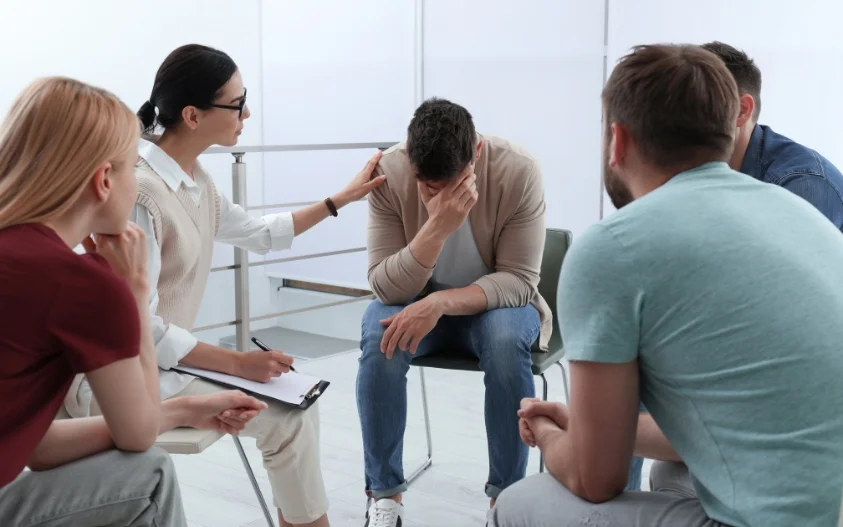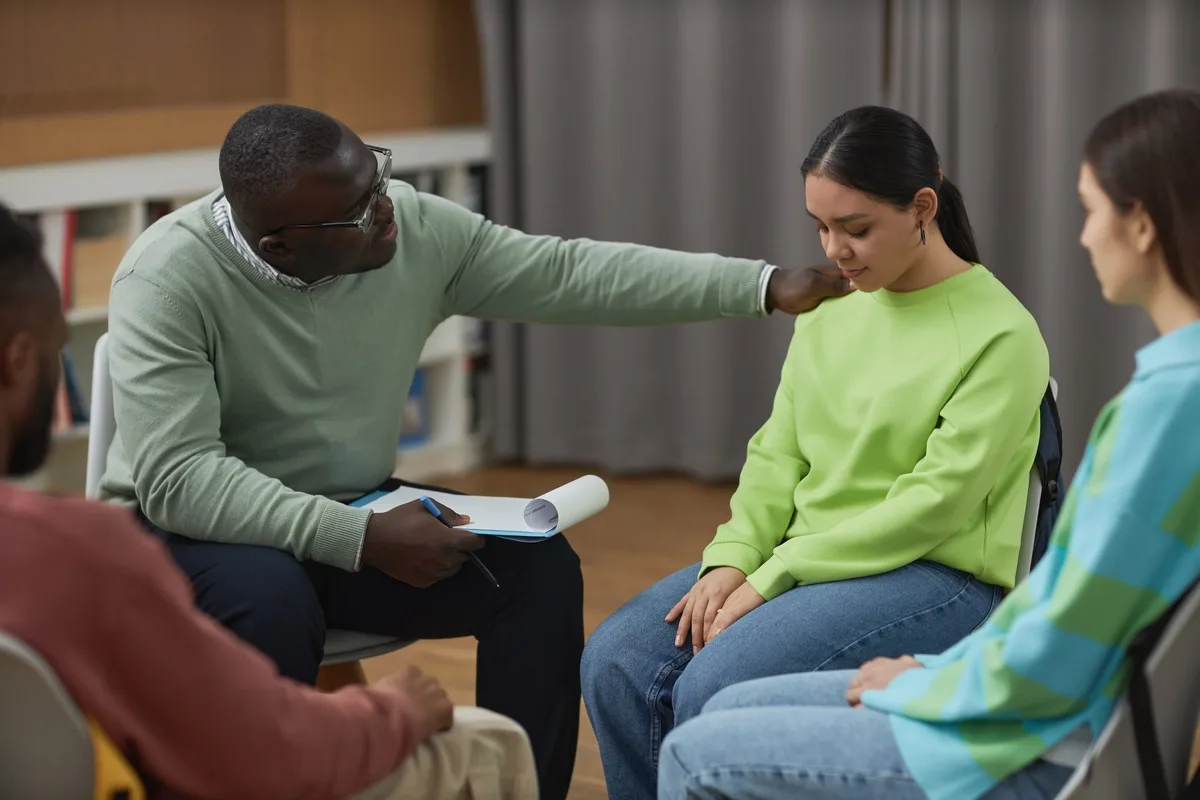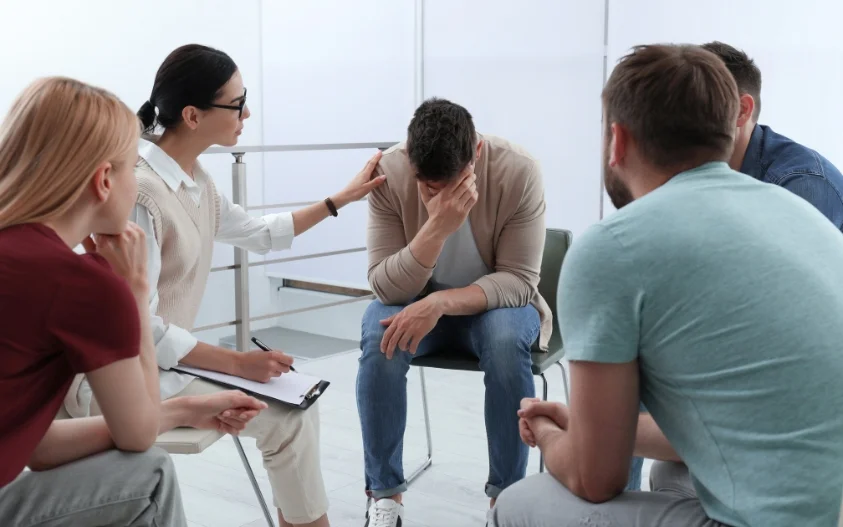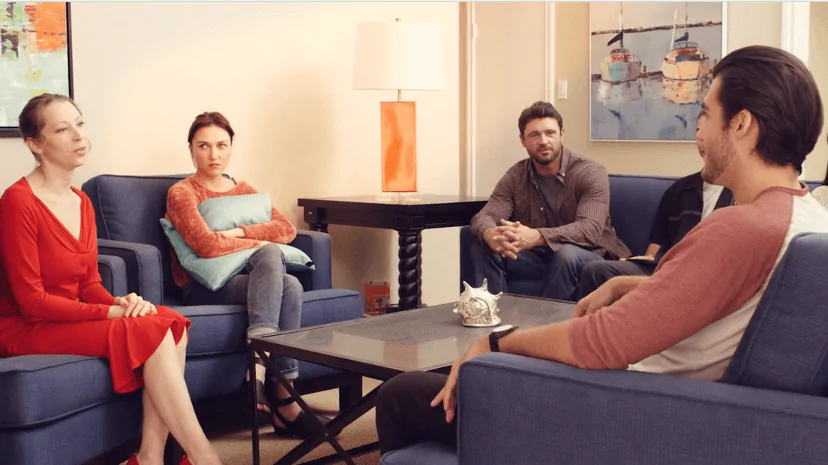24/7 Helpline:
(866) 899-111424/7 Helpline:
(866) 899-1114
Learn more about Ritalin Rehab centers in Ohio
Ritalin Rehab in Other Cities

Other Insurance Options

BHS | Behavioral Health Systems

MVP Healthcare

Anthem

WellPoint

CareFirst

Carleon

Self-pay options

Cigna

UnitedHealth Group

Providence

Health Partners

Coventry Health Care

Highmark

Regence

Group Health Incorporated

Private insurance

Premera

American Behavioral

Magellan

Choice Care Network

The Woods at Parkside
The Woods at Parkside is a CARF accredited substance abuse and co-occurring mental health treatment ...

Lumiere Healing Centers
Lumiere Healing Centers is a trusted drug rehab facility located in West Chester Township, Ohio. The...

BrightView
BrightView in Cincinnati, Ohio is an accredited addiction treatment center for adults struggling wit...

Beckett Springs
Beckett Springs is a 72 bed behavioral hospital located in the township of West Chester, OH, near Ci...

Zepf Center – Ashland
Zepf Center – Ashland is a drug and alcohol rehab located in Toledo, OH. They provide outpatient add...

Lindner Center of HOPE – Inpatient
Lindner Center of HOPE – Inpatient is a drug and alcohol rehab and medical facility located in Mason...

Oasis Recovery Center
Oasis Recovery Center in Newton Falls, OH is an accredited dual-diagnosis addiction treatment rehab ...

Meridian HealthCare – TASC
Meridian HealthCare is a community-based, non-profit organization located in Youngstown, OH. Meridia...

The Ridge Ohio
The Ridge is a boutique alcohol and drug rehabilitation facility on 51 private acres in Milford, Ohi...

Arrow Passage Recovery
Arrow Passage Recovery in Massillon, OH is an accredited dual-diagnosis addiction rehab center. It s...

The Recovery Village Columbus Drug and Alcohol Rehab
The Recovery Village Columbus Drug and Alcohol Rehab in Groveport, Ohio provides effective treatment...

Anazao Community Partners
Anazao Community Partners is an accredited behavioral health treatment center in Wooster, OH for chi...

Stella Maris
Stella Maris in Cleveland, Ohio is an accredited addiction treatment center for men and women. They ...

IBH Addiction Recovery Center
IBH Addiction Recovery Center is located in Akron, Ohio. IBH Addiction Recovery Center is designed t...

Ohio Addiction Recovery
The Community Medical Services (CMS) Columbus on High facility is a substance abuse treatment center...

AppleGate Recovery
AppleGate Recovery is a private rehab located in Elyria, Ohio. AppleGate Recovery specializes in the...

Brightview – Georgetown Addiction Treatment Center
The Brightview Georgetown Addiction Treatment Center is a substance abuse rehab in Georgetown, OH. T...

New Day Recovery – Medical Detox Center
The New Day Recovery Medical Detox Center in Rogers, OH offers full spectrum detox wraparound servic...

MetroHealth System – Inpatient
MetroHealth System – Inpatient is a co-occurring substance use disorder treatment center in Clevelan...

Spero Health – Columbus – West
Spero Health – Columbus – West is a private rehab located in Columbus, Ohio. Spero Health – Columbus...

Hopewell Health Centers – Gallipolis Behavioral Health Care Clinic
Hopewell Health Centers – Gallipolis Behavioral Health Care Clinic offers a range of comprehensive p...

Behavioral Healthcare Partners of Central Ohio – Messimer Drive
Behavioral Healthcare Partners of Central Ohio - Messimer Drive is located in Newark, Ohio. Behavior...

Ohio Treatment Center
The Toledo, Ohio Treatment Center is an accredited addiction treatment rehab for adults. It provides...

Findlay Recovery Center
The Findlay Recovery Center is a CARF-accredited drug and alcohol treatment rehab in Toledo, Ohio. T...

Lake Geauga Recovery Centers
Lake Geauga Recovery Centers provides a wide range of services for adults whose lives have been affe...

Prosperity Haven
Prosperity Haven is an accredited drug and alcohol addiction rehab in Chardon, Ohio for men. Standin...

Rosary Hall – St Vincent Charity
Rosary Hall – St Vincent Charity is a non-profit rehab located in Cleveland, Ohio. Rosary Hall – St ...

New Visions
New Visions is a private rehab located in Beachwood, Ohio. New Visions specializes in the treatment ...

Lutheran Social Services
Lutheran Social Services is a private rehab located in Toledo, Ohio. Lutheran Social Services specia...

Recovery Services of Northwest Ohio – Serenity Haven
Recovery Services of Northwest Ohio - Serenity Haven is a sixteen bed facility that focuses on provi...

Midwest Recovery Center
Midwest Detox Center in Maumee, Ohio is an accredited dual-diagnosis rehab center. It provides detox...

Ohio River Valley Halfway House
Ohio River Valley Halfway House is a private rehab located in Dayton, Ohio. Ohio River Valley Halfwa...

Community Action Against Addiction
Community Action Against Addiction is a drug and alcohol rehab located in Cleveland, Ohio. The cente...

The Counseling Center of Columbiana County
The Counseling Center of Columbiana County is located in East Liverpool, Ohio. The Counseling Center...

House of Hope
House of Hope is a drug and alcohol treatment facility in Columbus, Ohio. Their holistic treatment p...

Community Health Center – South Portage Path
Community Health Center - South Portage Path is a nonprofit rehab located in Akron, Ohio. Community ...

Prospect House
The Mission of Prospect House is to provide high quality drug and alcohol treatment in a long-term r...

Foundations Behavioral Health Services
Foundations Behavioral Health Services is a community-based behavioral health center serving Mercer ...

New Destiny Treatment Center
New Destiny Treatment Center is a recovery center located in Clinton, OH. New Destiny Treatment Cent...

Mid Ohio Psychological Services
Mid-Ohio Psychological Services is a drug and alcohol rehab and psychiatric facility located in Newa...

Health Resource Center of Cincinnati
Health Resource Center of Cincinnati offers outpatient treatment for individuals with alcohol and/or...

Maryhaven Mt. Gilead
Maryhaven Mt. Gilead is a private rehab located in Mount Gilead, Ohio. Maryhaven Mt. Gilead speciali...

Noble House
Noble House offers inpatient services for men ages 18 and over, with a Mental Health diagnosis and/o...

Mansfield Urban Alcohol and Drug Abuse Program
Mansfield Urban Alcohol and Drug Abuse Program is a private rehab located in Mansfield, Ohio. Mansfi...

Maryhaven Marion
Maryhaven Marion is a private rehab located in Marion, Ohio. Maryhaven Marion specializes in the tre...

DVPI – Renew Counseling and Recovery Center
DVPI - Renew Counseling and Recovery Center helps victims of domestic violence become survivors by p...

Volunteers of America – Residential Reentry
The Volunteers of America (VOA) Residential Reentry facility is a CARF-accredited substance abuse re...

Shepherd Hill
Shepherd Hill is a private rehab located in Newark, Ohio. Shepherd Hill specializes in the treatment...

Consolidated Care
Consolidated Care is a non-profit agency serving Bellefontaine, Ohio. Consolidated Care provides com...

Talbert House – Passages for Young Women
Talbert House - Passages for Young Women helps girls cope with addiction, mental health and/or invol...

The LCADA Way – West Park Drive
The LCADA Way - West Park Drive is a nonprofit rehab located in Lorain, Ohio. The LCADA Way - West P...

Rehabilitation Care Group
Rehabilitation Care Group is a private rehab located in Columbus, Ohio. Rehabilitation Care Group sp...

Crossroads Counseling Services
Crossroads Counseling Services offers outpatient services for individuals struggling with substance ...

Nationwide Childrens Hospital – Behavioral Health
Nationwide Childrens Hospital – Behavioral Health is a non-profit rehab located in Columbus, Ohio. N...

Harbor Behavioral Health – 22nd Street
Harbor Behavioral Health - 22nd Street is located in Toledo, Ohio. Harbor Behavioral Health - 22nd S...

Health Recovery Services – Chemical Dependency
Health Recovery Services - Chemical Dependency is a non-profit business and Drug Free Workplace serv...

Alcoholism and Drug Abuse Center
Alcoholism and Drug Abuse Center is a private rehab located in Wilmington, Ohio. Alcoholism and Drug...

L & P Services – Colgate Drive
L & P Services – Colgate Drive is a private rehab located in Marietta, Ohio. L & P Services – Colgat...

Talbert House – Project PASS – STEPS
Talbert House - Project PASS/STEPS helps children cope with addiction, mental health and/or involvem...

Village Network – Brite Futures
Village Network – Brite Futures is a private rehab located in Saint Clairsville, Ohio. Village Netwo...

The Crossroads Center
The Crossroads Center in Cincinnati, Ohio, is a private rehab center specializing in treating drug a...

Glenbeigh Outpatient
Glenbeigh Outpatient - Belpar offers different programs for individuals with alcohol and/or substanc...

Scioto Paint Valley Mental Health Center – Floyd Simantel Clinic
Scioto Paint Valley Mental Health Center- Flyod Simantel Clinic is located in Chillicothe, Ohio. The...

Turning Point Counseling Services
Turning Point Counseling Services specializes in the highest quality behavioral health care and subs...

Addiction Services Council
Addiction Services Council is a private rehab located in Cincinnati, OH. Addiction Services Council ...

PsyCare – Cortland
PsyCare – Cortland is a private rehab located in Cortland, Ohio. PsyCare – Cortland specializes in t...

Six County – Crisis Stabalization
Six County – Crisis Stabalization is a public rehab located in Zanesville, Ohio. Six County – Crisis...

Bethesda Blue Ash Treatment
Bethesda Blue Ash Treatment is a private rehab located in Cincinnati, Ohio. Bethesda Blue Ash Treatm...

Family Service Association – Dayton
Family Service Association – Dayton is a private rehab located in Dayton, Ohio. Family Service Assoc...

Churchill Counseling Services
Churchill Counseling Services is a private rehab located in Canfield, Ohio. Churchill Counseling Ser...

Homes for Kids of Ohio
Homes for Kids of Ohio is a private rehab located in Niles, Ohio. Homes for Kids of Ohio specializes...

Comprehensive Psychiatry Group
Comprehensive Psychiatry Group is a private rehab located in Youngstown, Ohio. Comprehensive Psychia...

Bellefaire Jewish Childrens Bureau
Bellefaire Jewish Childrens Bureau is a private rehab located in Cleveland, Ohio. Bellefaire Jewish ...

Firelands Counseling and Recovery Services
Firelands Counseling and Recovery Services provides a full spectrum of mental health and substance a...

Lakewood Hospital – Behavioral Health
Lakewood Hospital – Behavioral Health is a private rehab located in Lakewood, Ohio. Lakewood Hospita...

Community Assessment and Treatment
Community Assessment and Treatment is a private rehab located in Cleveland, Ohio. Community Assessme...

Crossroads
Crossroads provides a continuum of quality life-changing behavioral health services for children, ad...

Goodwill Easter Seals Miami Valley
Goodwill Easter Seals Miami Valley is a private rehab located in Dayton, Ohio. Goodwill Easter Seals...

CommQuest – Deliverance House
CommQuest – Deliverance House is a drug and alcohol rehab in Canton, Ohio. They provide residential ...

Southeast New Philadelphia Office
Southeast New Philadelphia Office is a private rehab located in New Philadelphia, Ohio. Southeast Ne...

Southeastern Ohio Counseling Center
Southeastern Ohio Counseling Center is a private rehab located in Old Washington, Ohio. Southeastern...

Lorain Urban Minority Alcohol and Drug Treament
Lorain Urban Minority Alcohol and Drug Treatment is a non-profit rehab located in Lorain, OH. Lorain...

PsyCare – Howland Clinic
PsyCare – Howland Clinic is a private rehab located in Warren, Ohio. PsyCare – Howland Clinic specia...

North Community Counseling Centers Bridge
North Community Counseling Centers Bridge provides mental health and substance abuse services to ind...

Murtis Taylor Human Services System – Detroit Avenue
Murtis Taylor Human Services System - Detroit Avenue provides settlement house and adult and childre...

CompDrug
CompDrug is one of the largest comprehensive organizations in Ohio offering prevention, intervention...

North Central Mental Health Services – Spruce Street
North Central Mental Health Services - Spruce Street is a comprehensive, community-based mental heal...

Spencer House – Men’s Recovery Center
Spencer House is a Men’s Recovery Center facility for substance abuse treatment in Newark, OH. Their...

Community Counseling Center
Community Counseling Center is a non-profit behavioral health provider focused on engaging the commu...

Center for Addiction Treatment
Center for Addiction Treatment is a nonprofit rehab located in Cincinnati, Ohio. Center for Addictio...

Oesterlen Services for Youth
Oesterlen Services for Youth is a private rehab located in Springfield, Ohio. Oesterlen Services for...

Equitas Health
Equitas Health is a private rehab located in Columbus, Ohio. Equitas Health specializes in the treat...

The John W. Clem Recovery House
The John W. Clem Recovery House is a residential rehab center located in Athens, The John W. Clem Re...

Ridgeview Behavioral Hospital
Ridgeview Behavioral Hospital treats behavioral and co-occurring substance abuse disorders in Middle...

Mercy Behavioral Health – Saint Charles Hospital
Mercy Health Behavioral Health Institute- St. Charles is a department of Vincent Medical Center loca...

Compass Family and Community Services – Riverbend Center
COMPASS Family and Community Services–Riverbend Clinic, in Warren, Ohio, is a mental health and dual...

Kettering Behavioral Medicine Center
Kettering Behavioral Medicine Center is a faith based mental health treatment center located in Dayt...

Joseph House
Joseph House is a residential treatment facility that offers treatment to homeless veterans sufferin...

Buckeye Ranch – East Broad
Buckeye Ranch – East Broad is a private rehab located in Columbus, Ohio. Buckeye Ranch – East Broad ...

Adolescent Substance Abuse Programs (ASAP)
Adolescent Substance Abuse Programs (ASAP) is located in Cincinnati, Ohio. At Adolescent Substance A...

Six County – Counseling
Six County – Counseling is a private rehab located in Mcconnelsville, Ohio. Six County – Counseling ...

Fort Hamilton Hospital – Behavioral Health
Fort Hamilton Hospital – Behavioral Health is a private rehab located in Hamilton, Ohio. Fort Hamilt...
Beacon Health – Mentor Avenue
Beacon Health – Mentor Avenue is a private rehab located in Mentor, Ohio. Beacon Health – Mentor Ave...

Scioto Paint Valley Mental Health Center
Scioto Paint Valley Mental Health Center provides help for drug addiction, alcoholism, and a variety...

Marion Area Counseling Center – MACC
Marion Area Counseling Center (MACC) is a private not-for-profit full service mental health agency p...

Volunteers of America
Volunteers of America is a non-profit rehab located in Columbus, Ohio. Volunteers of America special...

CommQuest – BRIGHT House
CommQuest - BRIGHT and Smith Houses are located in Canton, Ohio. CommQuest - BRIGHT and Smith Houses...

A Renewed Mind – Adams Street
A Renewed Mind- Adams Street, located in Toledo Ohio, offers drug and alcohol treatment services to ...

Meridian HealthCare – Main Campus
Meridian Healthcare- Main Campus, located in Youngstown, Ohio, is an alcohol and drug rehab center t...

Marsh Foundation
Marsh Foundation is a private rehab located in Van Wert, Ohio. Marsh Foundation specializes in the t...

Consolidated Care
Consolidated Care is a non-profit agency serving West Liberty, Ohio. Consolidated Care provides comp...

TKC Turning Point
Terrence Kelleman Counseling is a private rehab located in Cleveland, OH. Terrence Kelleman Counseli...

CommQuest
CommQuest is located in Canton, Ohio. CommQuest provides Addiction Recovery and Prevention, Clinical...

OneEighty – Spink Street
OneEighty - Spink Street offers outpatient services for individuals with a Mental Health diagnosis a...

Akron VA Multi Specialty Outpatient Clinic – Annex
Akron VA Multi-Specialty Outpatient Clinic is a substance abuse and co-occurring disorder rehab in A...

PsyCare – Liberty Clinic
PsyCare – Liberty Clinic is a private rehab located in Youngstown, Ohio. PsyCare – Liberty Clinic sp...

Coleman Professional Services
Coleman Professional Services is a private rehab located in Kent, Ohio. Coleman Professional Service...

Crossroads Recovery Services
Crossroads Recovery Services offers outpatient treatment for individuals with alcohol and/or substan...

Concord Counseling Services
Concord Counseling Services is a private rehab located in Westerville, Ohio. Concord Counseling Serv...

FrontLine Service
FrontLine Service is a traditional rehab located in Cleveland, OH. FrontLine Service specializes in ...

Lighthouse Youth Services
Lighthouse Youth Services is a private rehab located in Cincinnati, Ohio. Lighthouse Youth Services ...

Blick Clinic
Blick Clinic is a private rehab located in Akron, Ohio. Blick Clinic specializes in the treatment of...

Ravenwood Health
Ravenwood Health - East High street is a private rehab located in Middlefield, Ohio. Ravenwood Healt...

Community Action for Capable Youth – CACY
Community Action for Capable Youth (CACY) is a non-profit rehab located in Mansfield, OH. Community ...

Drug and Alcohol Counseling Center
Drug and Alcohol Counseling Center is a private rehab located in Youngstown, Ohio. Drug and Alcohol ...

Woodland Centers
Hopewell Health Centers (HHC) is a behavioral health center in Jackson, OH for children and adults. ...

Firelands Counseling and Recovery Services
Firelands Counseling and Recovery Services provides a full spectrum of mental health and substance a...

Perry Behavioral Health Choices – Stanton Villa
Perry Behavioral Health Choices - Stanton Villa offers a residential treatment program for those wom...

The LCADA Way – 32nd street
The LCADA Way - 32nd street is a non-profit rehab located in Lorain, Ohio. The LCADA Way - 32nd stre...

ViaQuest Psychiatric and Behavioral Solutions
ViaQuest Psychiatric and Behavioral Solutions is a private rehab located in Dublin, Ohio. ViaQuest P...

Solutions Community Counseling and Recovery Centers
Solutions Community Counseling and Recovery Centers provides effective, affordable mental health and...

The LCADA Way – 20th street
The LCADA Way - 20th street is a nonprofit rehab located in Lorain, Ohio. The LCADA Way - 20th stree...

New Direction Treatment Services
New Direction Treatment Services is a reputable substance abuse rehab center in Cincinnati, Ohio for...

Health Recovery Services – Mental Health
Health Recovery Services - Mental Health is a non-profit business and Drug Free Workplace serving th...

Atrium Medical Center – Behavioral Health
Stepping Stones Treatment Center, in Joliet, Illinois, is a 12 step-focused drug and alcohol rehab f...

Village Network – Newark
Village Network – Newark is a private rehab located in Newark, Ohio. Village Network – Newark specia...

Women’s Recovery Center
Women’s Recovery Center is a private rehab located in Cleveland, Ohio. Women’s Recovery Center speci...

Christian Childrens Home
Christian Childrens Home is a private rehab located in Wooster, Ohio. Christian Childrens Home speci...

Buckeye Counseling Center
Buckeye Counseling Center offers outpatient treatment for individuals with alcohol and/or substance ...

Ikron Corporation
Ikron Corporation is a non-profit rehab located in Cincinnati, Ohio. Ikron Corporation specializes i...

Westwood Behavioral Health Center
Westwood Behavioral Health Center is a private rehab located in Van Wert, Ohio. Westwood Behavioral ...

North Central – Norwich House
North Central – Norwich House is a private rehab located in Columbus, Ohio. North Central – Norwich ...

Community Support Services – Cross Street
Community Support Services – Cross Street is a private rehab located in Akron, Ohio. Community Suppo...

Compass Recovery Center
Compass Recovery Center is a private rehab located in Ravenna, Ohio. Compass Recovery Center special...

Greenleaf Family Center
Greenleaf Family Center is a private rehab located in Akron, Ohio. Greenleaf Family Center specializ...

Greater Cincinnati Behavioral Health Services
Greater Cincinnati Behavioral Health Services is the most comprehensive mental health provider in So...

Compass Point Counseling Services – Anderson
Compass Point Counseling Services is a behavioral health center in Cincinnati, OH for individuals an...

UMCH Family Services
UMCH Family Services is a private rehab located in Reynoldsburg, Ohio. UMCH Family Services speciali...

Public Health – Dayton and Montgomery County’s Addiction Services
Public Health - Dayton and Montgomery County's Addiction Services is located in Dayton, Ohio. Public...

Abraxas Ohio
Abraxas is a youth oriented drug and alcohol addiction recovery center in the heart of Shelby, Ohio....

Harbor Behavioral Health – Behavioral Connections – Devlac Hall
Harbor Behavioral Health – Devlac Hall is a co-occurring drug and alcohol treatment center based in ...

VA Northeast Ohio Healthcare System – New Philadelphia VA Outpatient Clinic
New Philadelphia VA Multi-Specialty Outpatient Clinic provides primary health care to eligible veter...

CommQuest – Wilson Hall
Commquest- Wilson Hall, located in Massillon, Ohio, is an alcohol, drug, and dual diagnosis treatmen...

Scioto Paint Valley Mental Health Center
Scioto Paint Valley Mental Health Center provides help for drug addiction, alcoholism, and a variety...

Southeast Healthcare Services – West Long Street
Southeast Healthcare Services – West Long Street is a drug and alcohol rehab located in Columbus, OH...

Ravenwood Health – Ravenwood Drive
Ravenwood Health - Ravenwood Drive is a private rehab located in Chardon, Ohio. Ravenwood Health - R...

Anazao Community Partners
Anazao Community Partners - East Market Street offers outpatient treatment for individuals with alco...

The Recovery Council – Georgie Harris House
At The Recovery Council - Georgie Harris House, they provide quality, abstinence-based treatment whi...

VA Northeast Ohio Healthcare System – Mansfield VA Outpatient Clinic
Mansfield VA Multi-Specialty Outpatient Clinic provides primary health care to eligible veterans usi...

CommQuest – Cleveland Avenue
CommQuest is located in Canton, Ohio. CommQuest provides education, prevention, and treatment of alc...

Consolidated Care
Consolidated Care is a non-profit agency serving Urbana, Ohio. Consolidated Care provides compassion...

Townhall II – Horizon House
Townhall II - Horizon House is a halfway house that provides a 90-day specialized treatment program ...

Greater Cincinnati Behavioral Health Services – Madison Road
Greater Cincinnati Behavioral Health Services – Madison Road is a private rehab located in Cincinnat...

Shawnee Mental Health Center – Portsmouth
Shawnee Mental Health Center – Portsmouth is a private rehab located in Portsmouth, Ohio. Shawnee Me...

Lake Area Recovery Center – Turning Point
Turning Point is a non-profit rehab located in Ashtabula, Ohio. Turning Point specializes in the tre...

New Creation Counseling Center
New Creation Counseling Center is a private rehab located in Tipp City, Ohio. New Creation Counselin...

Maryhaven Delaware
Maryhaven Delaware is a private rehab located in Delaware, Ohio. Maryhaven Delaware specializes in t...

Mental Health Services for Clark and Madison County
Mental Health Services for Clark and Madison County - North Main street is a private rehab located i...

Lake Geauga Recovery Centers
Lake Geauga Recovery Centers provides a wide range of services for adults whose lives have been affe...

Haven Behavioral Hospital
Haven Behavioral Hospital is a private rehab located in Dayton, Ohio. Haven Behavioral Hospital spec...

Catalyst Life Services – The Center Adult Mental Health and Crisis Services
Catalyst Life Services - The Center Adult Mental Health and Crisis Services is a dual diagnosis beha...

Psych and Psych Services
Since 1980, Psych and Psych Services has been dedicated to providing the most effective and consider...

Community Treatment and Correction
Community Treatment and Correction is an outpatient rehab located in Canton, OH. Community Treatment...

Village Network
Village Network is a private rehab located in Mount Vernon, Ohio. Village Network specializes in the...

Solutions Community Counseling and Recovery Centers
Solutions Community Counseling and Recovery Centers provides effective, affordable mental health and...

North Summit Family Solutions
North Summit Family Solutions is a private rehab located in Twinsburg, Ohio. North Summit Family Sol...

CenterPoint Treatment
CenterPoint Treatment is a private rehab located in Cleveland, Ohio. CenterPoint Treatment specializ...

Firelands Counseling and Recovery Services
Firelands Counseling and Recovery Services provides a full spectrum of mental health and substance a...

Comprehensive Behavioral Health
Comprehensive Behavioral Health is a private rehab located in Youngstown, Ohio. Comprehensive Behavi...

Huckleberry House
Huckleberry House is a private rehab located in Columbus, Ohio. Huckleberry House specializes in the...

PsyCare – Calcutta Family Care
PsyCare – Calcutta Family Care is a private rehab located in East Liverpool, Ohio. PsyCare – Calcutt...

North Central Mental Health Services – North High Street
North Central Mental Health Services – North High Street is a drug and alcohol rehab located in Colu...

Glenbeigh Outpatient
Glenbeigh Outpatient - South Green Road offers different programs for individuals with alcohol and/o...

Women’s Recovery Center
Women’s Recovery Center is a drug and alcohol rehab located in Xenia, Ohio. They provide outpatient ...

Recovery Resources – Pearl Road
Recovery Resources - Pearl Road is a nonprofit community-based behavioral healthcare organization th...

Sunrise Treatment Center – West side
Sunrise Treatment Center – West side is a private rehab located in Cincinnati, Ohio. Sunrise Treatme...

Centerpoint Health
Centerpoint Health is a private rehab located in Cincinnati, Ohio. Centerpoint Health specializes in...

Nova Behavioral Health
Nova Behavioral Health is located in Dayton, Ohio. Nova Behavioral Health offers a continuum of alco...

Comprehensive Crisis Care
Comprehensive Crisis Care is a private rehab located in Napoleon, Ohio. Comprehensive Crisis Care sp...

Zepf Center – West Central Avenue
Zepf Center is a dual diagnosis drug and alcohol treatment center in Toledo, OH. The facility provid...

Key Decisions – Positive Choices
Key Decisions – Positive Choices is a private rehab located in Cleveland, Ohio. Key Decisions – Posi...

Recovery Services of Northwest Ohio
Recovery Services of Northwest Ohio is a non-profit (501c3) organization that specializes in serving...

Adena Regional Medical Center – Inpatient Behavioral Health Unit
Adena Regional Medical Center - Inpatient Behavioral Health Unit is a private rehab located in Chill...

Recovery & Wellness
Recovery & Wellness provides mental health services in an outpatient basis to those individuals in n...

Signature Health – Willoughby
Signature Health – Willoughby is a drug and alcohol rehab located in Willoughby, OH. They provide ou...

Maryhaven
MaryHaven- Columbus is a comprehensive alcohol and drug treatment center located in Columbus, Ohio. ...

Community Health Center – Adult Treatment Center
Community Health Center - Adult Treatment Center is a nonprofit rehab located in Akron, Ohio. Commun...

Family Service Association
Family Service Association is a private rehab located in Steubenville, Ohio. Family Service Associat...

The Urban Minority Alcoholism and Drug Abuse Outreach Program
The Urban Minority Alcoholism and Drug Abuse Outreach Program offers outpatient services for individ...

Scioto Paint Valley Mental Health Center
Scioto Paint Valley Mental Health Center is a private rehab located in Waverly, Ohio. Scioto Paint V...

Coleman Professional Services – Crisis Services
Coleman Professional Services – Crisis Services is a drug and alcohol rehab and psychiatric facility...

TASC of Southeast Ohio
TASC of Southeast Ohio is a private rehab located in Gallipolis, Ohio. TASC of Southeast Ohio specia...

Village Network
Village Network is a private rehab located in Bethesda, Ohio. Village Network specializes in the tre...

Murtis Taylor Human Services System – 105th Street
Murtis Taylor Human Services System - 105th Street provides settlement house and adult and children'...

ADAMHS of Montgomery County
ADAMHS of Montgomery County is a non-profit rehab located in Dayton , OH. ADAMHS of Montgomery Count...

New Horizons Mental Health
New Horizons Mental Health is a private rehab located in Pickerington, Ohio. New Horizons Mental Hea...

Crisis Intervention Recovery Center – 13th street Nw
Crisis Intervention Recovery Center (CIRC) is a substance abuse drug rehab in Canton, OH. Now part o...

Camelot Community Care
Camelot Community Care is a private rehab located in Cincinnati, Ohio. Camelot Community Care specia...

Behavioral Healthcare Partners of Central Ohio
Behavioral Healthcare Partners of Central Ohio is located in Mount Vernon, Ohio. Behavioral Healthca...

Alcohol and Drug Services of Guernsey County
Alcohol and Drug Services of Guernsey County is a private rehab located in Cambridge, OH. Alcohol an...

National Youth Advocate Program – Columbus
National Youth Advocate Program (NYAP) is committed to the well-being of those we serve and provide ...

Compass Family and Community Services
Compass Family and Community Services is a private rehab located in Youngstown, Ohio. Compass Family...

Directions for Youth and Families – Indianola Avenue
Directions for Youth and Families – Indianola Avenue is a private rehab located in Columbus, Ohio. D...

Cleveland Treatment Center
Cleveland Treatment Center is located in Cleveland, Ohio. Cleveland Treatment Center was incorporate...

Hitchcock Center for Women
Hitchcock Center for Women is a drug and alcohol rehab located in Cleveland, Ohio. They provide resi...

Aultman Hospital – Behavioral Health Services
Aultman Hospital – Behavioral Health Services is a private rehab located in Canton, Ohio. Aultman Ho...

Mercy Health Saint Elizabeth – Behavioral Health
Mercy Health Saint Elizabeth – Behavioral Health is a private rehab located in Youngstown, Ohio. Mer...

Wellness Card
Wellness Card is a private rehab located in Dayton, Ohio. Wellness Card specializes in the treatment...

Lutheran Social Services
Lutheran Social Services - Eastern Region Office is a non profit rehab located in Fremont, OH. Luthe...

Samaritan Behavioral Health
Samaritan Behavioral Health is a private rehab located in Dayton, Ohio. Samaritan Behavioral Health ...

Broadbent Group
Broadbent Group is a private rehab located in Cleveland, Ohio. Broadbent Group specializes in the tr...

Catholic Charities – Hispanic Program
Catholic Charities - Hispanic Program is located in Cleveland, Ohio. Catholic Charities - Hispanic P...

South Community
South Community is a private rehab located in Dayton, Ohio. South Community specializes in the treat...

Pathways Counseling Center
Pathways Counseling Center is a drug and alcohol rehab located in Ottawa, OH. They provide outpatien...

Ohio Valley Teen Challenge
Ohio Valley Teen Challenge is a long-term live-in recovery support and Christian discipleship progra...

Crossroads Counseling Services
Crossroads Counseling Services offers outpatient services for individuals struggling with substance ...

Eastway Behavioral Healthcare
Eastway Behavioral Healthcare is the largest, not-for-profit provider of mental health services in t...

Greater Cincinnati Behavioral Health Services – Clermont Recovery Center
The Greater Cincinnati Behavioral Health Services (GCBHS) – Clermont Recovery Center helps adults an...

Signature Health – Beachwood
Connections is dedicated to the diagnosis and treatment of mental illness and chemical dependency, a...

Murtis Taylor Human Services System – Fulton Road
Murtis Taylor Human Services System - Fulton Road provides settlement house and adult and children's...

University Hospitals Geauga Medical Center – Behavioral Health
University Hospitals Geauga Medical Center – Behavioral Health, located in Chardon, Ohio, offers tre...

Scioto Paint Valley Mental Health Center – Martha Cottrill Clinic
Scioto Paint Valley Mental Health Center - Martha Cottrill Clinic provides help for drug addiction, ...

Cleveland Rehabilitation
Cleveland Rehabilitation is a private rehab located in Cleveland, Ohio. Cleveland Rehabilitation spe...

Meridian HealthCare – South Campus
Meridian HealthCare is a community-based, non-profit organization located in Youngstown, OH. Meridia...

Arrowhead Behavioral Health
Arrowhead Behavioral Health is a dual diagnosis drug rehab center located in Maumee, OH, that offers...

University of Cincinnati – Addiction Sciences
University of Cincinnati – Addiction Sciences is a private rehab located in Cincinnati, Ohio. Univer...

Firelands Counseling and Recovery Services
Firelands Counseling and Recovery Services provides a full spectrum of mental health and substance a...

Mended Reeds Mental Health
Mended Reeds Mental Health (MRMH) is an alcohol and drug rehab center in Ironton, Ohio. They serve m...

VANTAGE Aging – Behavioral Health Solutions
VANTAGE Aging is a nonprofit organization that addresses the needs of older adults facing mental hea...

Community Mental Healthcare
Community Mental Healthcare offers comprehensive treatment services including programs for alcoholis...

Child and Adolescent Behavioral Health
Child and Adolescent Behavioral Health (C&A) is a full service, non-profit, trauma-informed mental h...

Highland District Hospital – Behavioral Health
Highland District Hospital – Behavioral Health is a private rehab located in Hillsboro, Ohio. Highla...

Recovery Centers
Recovery Centers is a private rehab located in Lancaster, Ohio. Recovery Centers specializes in the ...

PsyCare – Austintown Clinic
PsyCare – Austintown Clinic is a private rehab located in Youngstown, Ohio. PsyCare – Austintown Cli...

Syntero – Mill Run
Syntero - Mill Run provides compassionate, expert therapeutic counseling, home-based and community-b...

Counseling Center
Counseling Center is a private rehab located in Rittman, Ohio. Counseling Center specializes in the ...

Counseling Center – Outpatient
Counseling Center – Outpatient is a private rehab located in Portsmouth, Ohio. Counseling Center – O...

Child Guidance and Family Solutions
Child Guidance and Family Solutions is a private rehab located in Akron, Ohio. Child Guidance and Fa...

Alcohol and Drug Freedom Center
Alcohol and Drug Freedom Center is a private rehab located in Mount Vernon, OH. Alcohol and Drug Fre...

Catalyst Life Services – The Rehab Center
Catalyst Life Services is a dual diagnosis drug and alcohol addiction treatment center based in Mans...

CommQuest
CommQuest is located in Massillon, Ohio. CommQuest provides education, prevention, and treatment of ...

Community Assessment Foundation
Community Assessment Foundation is a private rehab located in Cleveland, Ohio. Community Assessment ...

The Nord Center
The Nord Center provides comprehensive behavioral and mental health services to children, adolescent...

Sperohealth
Sperohealth is a private rehab located in Boardman, Ohio. Sperohealth specializes in the treatment o...

Unison Health – Woodruff Avenue
Unison Health - Woodruff Avenue is a nonprofit rehab located in Toledo, Ohio. Unison Health - Woodru...

Townhall II
Townhall II promotes the health, wellness, and recovery of individuals and communities through preve...

PsyCare – Boardman Clinic
PsyCare – Boardman Clinic is a private rehab located in Boardman, Ohio. PsyCare – Boardman Clinic sp...

Eastway – Webster Street Academy and Family Center
Eastway - Webster Street Academy and Family Center provides a unique holistic approach to serve the ...

Ashtabula County Medical Center – Behavioral Health
Ashtabula County Medical Center - Behavioral Health provides behavioral health care and mental healt...

The Recovery Council
At The Recovery Council, they provide quality, abstinence-based treatment while offering hope and he...

Health Recovery Services
Health Recovery Services, is a non-profit business and Drug Free Workplace serving those affected wi...

The Counseling Center of Wayne and Holmes Counties
The Counseling Center of Wayne and Holmes Counties is a private rehab located in Orrville, Ohio. The...

Bayshore Counseling Services
Bayshore Counseling Services is located in Sandusky, Ohio. Bayshore Counseling Services provides a c...

Centers for Families and Children – East Office
Centers for Families and Children – East Office is a private rehab located in Cleveland, Ohio. Cente...

University Hospitals Parma Medical Center – Behavioral Center for Older Adults
University Hospitals Parma Medical Center - Behavioral Center for Older Adults is a non profit rehab...

Counseling Center
Counseling Center is a private rehab located in Wooster, Ohio. Counseling Center specializes in the ...

The Central Community Health Board of Hamilton County
The Central Community Health Board of Hamilton County, Inc. (CCHB) is a private, non-profit comprehe...

Hispanic UMADAOP – Miguel Prieto Treatment Services
Hispanic UMADAOP - Miguel Prieto Treatment Services provides an individualized treatment program for...

Portage Path Behavioral Health – Broadway street
Portage Path Behavioral Health – Broadway street is a private rehab located in Akron, Ohio. Portage ...

Desert Island Club
Desert Island Club is private social club that hosts a variety of 12 step meetings, support groups a...

North Central Counseling
North Central Counseling is a comprehensive, community-based mental health and substance abuse treat...

Family Recovery Center – Fleming House
Family Recovery Center - Fleming House is a private, non-profit treatment facility providing substan...

Charak Center for Health and Wellness
Charak Center for Health and Wellness - Mccracken Road strives to bring hope to these individuals th...

Greentree Counseling Center
Greentree Counseling Center is a private rehab located in Warren, Ohio. Greentree Counseling Center ...

The Counseling Center of Columbiana County
The Counseling Center of Columbiana County is located in Salem, Ohio. The Counseling Center of Colum...

First Step Home – Residential
First Step Home – Residential is a private rehab located in Cincinnati, Ohio. First Step Home – Resi...

Family Recovery Center
Family Recovery Center is a private, non-profit treatment facility providing substance abuse treatme...

Oriana House – Crisis Team
Oriana House – Crisis Team is a private rehab located in Akron, Ohio. Oriana House – Crisis Team spe...

Specialty Care Counseling Services
Specialty Care Counseling Services is a private rehab located in Warren, Ohio. Specialty Care Counse...

Hopewell
Hopewell is a private rehab located in Mesopotamia, Ohio. Hopewell specializes in the treatment of M...

TCN Behavioral Health Services
TCN Behavioral Health Services is a non-profit organization that offers a wide variety of behavioral...

Recovery Resources
Recovery Resources is a nonprofit community-based behavioral healthcare organization that helps peop...

Solutions Community Counseling and Recovery Centers
Solutions Community Counseling and Recovery Centers provides effective, affordable mental health and...

The LCADA Way
Located in Elyria, Ohio, The LCADA Way provides alcohol and drug rehab services to men and women. Th...

Urban Ounce of Prevention Services
Urban Ounce of Prevention Services is a non-profit rehab located in Akron, Ohio. Urban Ounce of Prev...

Signature Health – Ashtabula
Signature Health provides Mental Health Services when you need it most, including psychiatry, case m...

Harbor Light – Outpatient Program
Harbor Light - Intensive Outpatient Program is a non profit rehab located in Cleveland, OH. Harbor L...

Portage Path Behavioral Health
Portage Path Behavioral Health is a private rehab located in Barberton, Ohio. Portage Path Behaviora...

Personal and Family Couseling – Guidestone
Personal and Family Couseling – Guidestone is a private rehab located in New Philadelphia, Ohio. Per...

Portage Path Behavioral Health
Portage Path Behavioral Health is a private rehab located in Cuyahoga Falls, Ohio. Portage Path Beha...

Central Ohio Mental Health Center – South Henry Street
Central Ohio Mental Health Center – South Henry Street is a private rehab located in Delaware, Ohio....

Amethyst
Amethyst is a private rehab located in Columbus, Ohio. Amethyst specializes in the treatment of alco...

Rescue Mental Health & Addiction Services
Rescue is a non-profit traditional rehab located in Toledo, Ohio. Rescue specializes in the treatmen...

ViaQuest Psychiatric and Behavioral Solutions
ViaQuest Psychiatric and Behavioral Solutions is a private rehab located in Dayton, Ohio. ViaQuest P...

Personal and Family Counseling – Harbor House
Personal and Family Counseling – Harbor House is a private rehab located in New Philadelphia, Ohio. ...

Project CURE
Vision Statement: Project C.U.R.E. Inc. is a unique agency that is the leading provider of quality s...

Morgan Behavioral Health Choices
Morgan Behavioral Health Choices provides substance abuse treatment in an outpatient setting for ind...

PsyCare – Struthers
PsyCare – Struthers is a private rehab located in Struthers, Ohio. PsyCare – Struthers specializes i...

Perry Behavioral Health Choices
Perry Behavioral Health Choices provides outpatient drug and alcohol treatment as well as prevention...

Premier Care of Ohio
Premier Care of Ohio is a private rehab located in Columbus, Ohio. Premier Care of Ohio specializes ...

Beech Brook
Beech Brook is a private rehab located in Elyria, Ohio. Beech Brook specializes in the treatment of ...

Recovery Services of Northwest Ohio
Recovery Services of Northwest Ohio is a non-profit (501c3) organization that specializes in serving...

Child Guidance and Family Solutions
Child Guidance and Family Solutions is a private rehab located in Cuyahoga Falls, Ohio. Child Guidan...

Family Resource Center
Family Resource Center is a private rehab located in Kenton, Ohio. Family Resource Center specialize...

Foundations for Living
Foundations for Living is a residential treatment center for youth, 11-17 years of age, with a minim...

Adams Recovery Center – Women’s Program
Adams Recovery Center – Women’s Program is a private rehab located in Loveland, Ohio. Adams Recovery...

Akron Community Development Associates – Minority Behavioral Health Group
Akron Community Development Associates – Minority Behavioral Health Group is a private rehab located...

Vertava Health Ohio
Vertava Health Ohio–The Bluffs is a comprehensive drug and alcohol rehab for adults in Sherrodsville...

VA Northeast Ohio Healthcare System – Warren VA Outpatient Clinic
Warren VA Multi-Specialty Outpatient Clinic provides primary health care to eligible veterans using ...

BrightView – Colerain Center
Addiction medicine is moving into a new era and at BrightView - Colerain Center they look to lead th...

Butler Behavioral Health Services
Butler Behavioral Health Services is a private rehab located in Middletown, Ohio. Butler Behavioral ...

ACCADA – Ashland County Council on Alcoholism and Drug Abuse
Ashland County Council on Alcoholism and Drug Abuse (ACCADA) provides a range of counseling, treatme...

Murtis Taylor Human Services System – Union Avenue
Murtis Taylor Human Services System - Union Avenue provides settlement house and adult and children'...

Beckett Springs Changes
Changes is a partial-day mental health and addiction treatment alternative for adults and adolescent...

Columbus Springs Dublin – Perimeter West
Columbus Springs Dublin is behavioral hospital offering outpatient mental health and addiction treat...

Talbert House – Turtle Creek Center
Talbert House- Turtle Creek Center is a halfway house for adult male felony offenders of parole or t...

VA Northeast Ohio Healthcare System – Parma VA Outpatient Clinic
Parma VA Multi-Specialty Outpatient Clinic provides primary health care to eligible veterans using a...

Alvis House
Alvis is a nonprofit agency in Columbus, OH offering research based reentry programs, substance abus...

Gateway Rehab – Neil Kennedy Recovery Center
Gateway Rehab - Neil Kennedy Recovery Center is the largest and most trusted addiction recovery netw...

Harbor Behavioral Health
Harbor Behavioral Health- Perrysburg is a behavioral healthcare program that provides substance use ...

Harbor Behavioral Health – Woodley Road
Harbor Behavioral Health offers community health services and substance use disorder treatment in To...

A Renewed Mind – Tremainsville
A Renewed Mind - Tremainsville is located in Toledo, Ohio. A Renewed Mind - Tremainsville provides q...

Columbus Springs Dublin – Citygate Drive
Columbus Springs Dublin - Citygate Drive is behavioral hospital offering outpatient mental health an...

The Buckeye Ranch – Mound Street
The Buckeye Ranch - Mound Street is a private, nonprofit organization with a comprehensive array of ...

Unison Health – Cherry Street
The Cherry Street Unison Health Center is an accredited behavioral health treatment facility based i...

Edwin Shaw Rehabilitation Hospital – Tallmadge Road
Edwin Shaw Rehabilitation Hospital–Tallmadge Road is a comprehensive, 12 step-focused drug and alcoh...

A Renewed Mind
A Renewed Mind is located in Defiance, Ohio. A Renewed Mind provides quality behavioral healthcare w...

A Renewed Mind
A Renewed Mind is located in Findlay, Ohio. A Renewed Mind provides quality behavioral healthcare wh...

Alvis Pages Treatment and Recovery Center
Alvis Pages Treatment and Recovery Center is located in Columbus, Ohio. Alvis Pages Treatment and Re...

Catalyst Life Services
Catalyst Life Services is located in Shelby, Ohio. Catalyst Life Services offers client focused beha...

Mental Health Services for Clark and Madison County – Yellow Springs Street
Mental Health Services for Clark and Madison County - Yellow Springs Street is a no-profit rehab loc...

North Community Counseling Centers West
North Community Counseling Centers West provides mental health and substance abuse services to indiv...

Unison Health – Starr Avenue
Unison Health is a comprehensive behavioral health and substance abuse treatment facility in Toledo,...

Murtis Taylor Human Services System – 13402 Kinsman Road
Murtis Taylor Human Services System - 13402 Kinsman Road provides settlement house and adult and chi...

Abraxas Cleveland Counseling Center
The Abraxas Counseling Center, located just outside of downtown Cleveland on the RTA bus line, serve...

VA Northeast Ohio Healthcare System – Ravenna VA Outpatient Clinic
Ravenna VA Multi-Specialty Outpatient Clinic provides primary health care to eligible veterans using...

Stella Maris – 1302 Washington Ave
Stella Maris - 1302 Washington Avenue is a non-profit rehab located in Cleveland, Ohio. Stella Maris...

The Buckeye Ranch – West Broad Street
The Buckeye Ranch - West Broad Street is a private, nonprofit organization with a comprehensive arra...

A Renewed Mind – Mental Health Outpatient Services
A Renewed Mind - Mental Health Outpatient Services is located in Perrysburg, Ohio. A Renewed Mind - ...

Lorain VA Multi Specialty Outpatient Clinic
Lorain VA Multi-Specialty Outpatient Clinic provides primary health care to eligible veterans using ...

Talbert House – Spring Grove Center
Talbert House is a social services agency that supports children, adults, and families to live healt...

Zepf Center – W. Woodruff Avenue
Zepf Center - W. Woodruff Avenue is a local non-profit that provides behavioral health and vocationa...

Behavioral Healthcare Partners of Central Ohio – River Valley
Behavioral Healthcare Partners of Central Ohio - River Valley is located in Newark, Ohio. Behavioral...

Glenbiegh Outpatient Center
Glenbiegh Outpatient Center offers different programs for individuals with alcohol and/or substance ...

A Renewed Mind
A Renewed Mind is located in Wauseon, Ohio. A Renewed Mind provides quality behavioral healthcare wh...

CommQuest – Detox
CommQuest - Outpatient Office is located in East Liverpool, Ohio. CommQuest - Outpatient Office prov...

Spero Health – Chillicothe
SelfRefind is located in Chillicothe, Ohio. SelfRefind offers affordable care for addiction recovery...

Spero Health – Zanesville
Spero Health – Zanesville is a private rehab located in Zanesville, Ohio. Spero Health – Zanesville ...

Glenbeigh Outpatient
Glenbeigh Outpatient - Center Ridge Road offers different programs for individuals with alcohol and/...

Spero Health – Marietta
SelfRefind is located in Marietta, Ohio. SelfRefind offers affordable care for addiction recovery.

Hopewell – Therapeutic Farm Community
Hopewell – Therapeutic Farm Community is a private rehab located in Middlefield, Ohio. Hopewell – Th...

VA Northeast Ohio Healthcare System – Akron VA Outpatient Clinic
VA Northeast Ohio Healthcare System - Akron VA Outpatient Clinic is an outpatient clinic located in ...

Counseling Alliance (TM)
Counseling Alliance (TM) is an outpatient treatment center located in both Cincinnati and Beavercree...

Project CURE – Daruma Parkway
Project CURE – Daruma Parkway is a private rehab located in Dayton, Ohio. Project CURE – Daruma Park...

Advanced Counseling Solutions
Advanced Counseling Solutions is a private rehab located in Youngstown, Ohio. Advanced Counseling So...

WCAP Counseling
WCAP Counseling is a private rehab located in Brice, Ohio. WCAP Counseling specializes in the treatm...

VA Northeast Ohio Healthcare System – Canton VA Outpatient Clinic
VA Northeast Ohio Healthcare System - Canton VA Outpatient Clinic is an outpatient clinic located in...

Allied Behavioral Health Services
Allied Behavioral Health Services is a private rehab located in Youngstown, Ohio. Allied Behavioral ...

Giving Tree
Giving Tree is a private rehab located in Oak Harbor, Ohio. Giving Tree specializes in the treatment...

Mount Vernon Recovery
Mount Vernon Recovery blends traditional drug and alcohol abuse treatment with holistic alternatives...

Preferred Care Counseling
Preferred Care Counseling is a private rehab located in Youngstown, Ohio. Preferred Care Counseling ...

North Central Mental Health Services
North Central Mental Health Services is a private rehab located in Columbus, Ohio. North Central Men...

OneEighty – E. Milltown Rd
OneEighty - E. Milltown Rd offers outpatient services for individuals with a Mental Health diagnosis...

McKinley Hall Mens Residential Program
McKinley Hall Mens Residential Program is a private rehab located in Springfield, Ohio. McKinley Hal...

Pike County Recovery Council
Pike County Recovery Council (PCRC) is an accredited drug and alcohol rehab in Waverly, OH. Their mu...

Samaritan Works – Amelia House
Samaritan Works - Amelia House is a recovery center located in Sidney, OH. Samaritan Works - Amelia ...

The Refuge Ministries
The Refuge Ministries is a faith-based residential recovery program located in Columbus, OH. There i...

Vista Psychological Counseling Centre
Vista Psychological Counseling Centre is a private rehab located in Canton, Ohio. Vista Psychologica...

VA Central Ohio Healthcare System – Daniel L. Kinnard VA Community Based Outpatient Clinic
VA Central Ohio Healthcare System - Daniel L. Kinnard VA Community Based Outpatient Clinic is a clin...

Operation 6:12
Operation 6:12 is a faith based sober living environment in Sugarcreek, OH offering separate residen...

Access Counseling Services – South Dixie Highway
Access Counseling Services (ACS) – South Dixie Highway is a mental health and addiction rehab counse...

Meridian HealthCare
Meridian HealthCare is a community-based, non-profit organization located in Warren, OH. Meridian He...

OneEighty
OneEighty offers outpatient services for individuals with a Mental Health diagnosis and/or Substance...

Wright State University – Substance Abuse Resource
Wright State University – Substance Abuse Resource is a private rehab located in Dayton, Ohio. Wrigh...

New Day Recovery
New Day Recovery is a non-profit rehab center located in Youngstown, OH. New Day Recovery specialize...

Emerge Ministries
Emerge Ministries is a private rehab located in Akron, Ohio. Emerge Ministries specializes in the tr...

AppleGate Recovery
AppleGate Recovery is a drug and alcohol rehab located in Huber Heights, OH. They provide outpatient...

VA Central Ohio Healthcare System – Zanesville Community Based Outpatient Clinic
VA Central Ohio Healthcare System - Daniel L. Kinnard VA Community Based Outpatient Clinic is a clin...

Recovery & Wellness
Recovery & Wellness provides outpatient services to those individuals struggling with behavioral hea...

Sojourner Recovery Services
Sojourner Recovery Services is a recovery center located in Hamilton, OH. Sojourner Recovery Service...

New Beginnings Recovery
New Beginnings Recovery stands as an accredited dual-diagnosis addiction rehab center in Van Wert, O...

VA Northeast Ohio Healthcare System – Lorain County VA Outpatient Clinic
VA Northeast Ohio Healthcare System - Lorain County VA Outpatient Clinic is an outpatient clinic loc...

Nancy Lowrie & Associates – NLA
Nancy Lowrie & Associates (NLA) offers treatment for all types of mental and behavioral health conce...

VA Northeast Ohio Healthcare System – Lake County VA Outpatient Clinic
VA Northeast Ohio Healthcare System - Lake County VA Outpatient Clinic is an outpatient clinic locat...

COPE
COPE is a private rehab located in Oak Harbor, Ohio. COPE specializes in the treatment of Substance ...

City Gospel Mission
City Gospel Mission is a recovery facility located in Cincinnati, OH. City Gospel Mission offers an ...

VA Northeast Ohio Healthcare System – East Liverpool VA Outpatient Clinic
VA Northeast Ohio Healthcare System - East Liverpool VA Outpatient Clinic is an outpatient clinic lo...

MedMark Treatment Centers
MedMark Treatment Centers is a private rehab located in Columbus, Ohio. MedMark Treatment Centers sp...

Sojourner Recovery Services – Outpatient
Sojourner Recovery Services – Outpatient is a private rehab located in Hamilton, Ohio. Sojourner Rec...

FMRS Health Systems Monroe County
FMRS Health Systems Monroe County is a private rehab located in Barnesville, Ohio. FMRS Health Syste...

AppleGate Recovery
AppleGate Recovery is a private rehab located in Willoughby, Ohio. AppleGate Recovery specializes in...

Boundless Behavioral Health
Boundless Behavioral Health is a private rehab located in Worthington, Ohio. Boundless Behavioral He...

Reach Behavioral Health
Reach Behavioral Health is a public rehab located in Brook Park, Ohio. Reach Behavioral Health speci...

The Mindful Healing Center
The Mindful Healing Center is an accredited outpatient treatment facility located in Middletown, OH ...

Brightview – Ashtabula Addiction Treatment Center
Brightview – Ashtabula Addiction Treatment Center is a private rehab located in Ashtabula, Ohio. Bri...

Brightview – Springfield Addiction Treatment Center
Brightview – Springfield Addiction Treatment Center is a private rehab located in Springfield, Ohio....

Brightview – Chillicothe Addiction Treatment Center
Brightview – Chillicothe Addiction Treatment Center is a private rehab located in Chillicothe, Ohio....

Brightview – Marion Addiction Treatment Center
Brightview – Marion Addiction Treatment Center is a private rehab located in Marion, Ohio. Brightvie...

Brightview – Columbus East Addiction Treatment Center
Brightview – Columbus East Addiction Treatment Center is a private rehab located in Reynoldsburg, Oh...

Brightview – Toledo Addiction Treatment Center
BrightView is a private substance abuse treatment facility in Maumee, Ohio, near Interstate 80. With...

Brightview – Canton Addiction Treatment Center
The Brightview Canton Addiction Treatment Center is a dual diagnosis rehab facility located in Massi...

Miami Valley Recovery
Miami Valley Recovery is a private rehab located in Dayton, Ohio. Miami Valley Recovery specializes ...

Brightview – Dayton Addiction Treatment Center
The Brightview Dayton Addiction Treatment Center is an accredited substance abuse treatment rehab in...

CSSL Mental Health & Addiction Treatment Services
Professional, compassion treatment you deserve and need for Mental Health, Dual Diagnosis, Detoxific...

MedMark Treatment Centers
MedMark Treatment Centers is a private rehab located in Lebanon, Ohio. MedMark Treatment Centers spe...

Spero Health – Marion
Spero Health – Marion is a private rehab located in Marion, Ohio. Spero Health – Marion specializes ...

Brightview – Portsmouth Addiction Treatment Center
Brightview – Portsmouth Addiction Treatment Center is a private rehab located in Portsmouth, Ohio. B...

Brightview – Columbus West Addiction Treatment Center
Brightview – Columbus West Addiction Treatment Center is a private rehab located in Columbus, Ohio. ...

Brightview – Newark Addiction Treatment Center
Brightview – Newark Addiction Treatment Center is a private rehab located in Newark, Ohio. Brightvie...

Brightview – Wilmington Addiction Treatment Center
Brightview – Wilmington Addiction Treatment Center is a private rehab located in Wilmington, Ohio. B...

Brightview – Piqua Addiction Treatment Center
Brightview – Piqua Addiction Treatment Center is a private rehab located in Piqua, Ohio. Brightview ...

Hotel California by the Sea – Cincinnati
Hotel California by the Sea – Cincinnati is a private rehab located in Cincinnati, Ohio. Hotel Calif...

Spero Health – Lima
Spero Health – Lima is a private rehab located in Lima, Ohio. Spero Health – Lima specializes in the...

Brightview – Warren Addiction Treatment Center
Brightview – Warren Addiction Treatment Center is a private rehab located in Warren, Ohio. Brightvie...

Midwest Recovery Center
Midwest Recovery Center, located in Toledo, Ohio, provides substance use disorder, mental health tre...

Praxis of Cleveland by Landmark Recovery
Praxis of Cleveland by Landmark Recovery is an accredited Medicaid addiction treatment center locate...

New Day Recovery – River Falls Residential Housing
New Day Recovery -- River Falls Residential Housing in Newton Falls, Ohio, serves adult men and youn...

Spero Health – Findlay
Spero Health – Findlay is a private rehab located in Findlay, Ohio. Spero Health – Findlay specializ...

New Season – Akron Treatment Center
New Season – Akron Treatment Center is a private rehab located in Akron, Ohio. New Season – Akron Tr...

National Youth Advocate Program – West Unity
National Youth Advocate Program - West Unity is a rehab facility located in Lima, OH. National Youth...

National Youth Advocate Program – Cleveland
National Youth Advocate Program (NYAP) is committed to the well-being of those we serve and provide ...

Spero Health – Warren
Spero Health – Warren is a private rehab located in Warren, Ohio. Spero Health – Warren specializes ...

MedMark Treatment Centers
MedMark Treatment Centers in Dayton, Ohio, offer specialized outpatient care for individuals battlin...

New Season – Mentor Treatment Center
New Season – Mentor Treatment Center is a private rehab located in Mentor, Ohio. New Season – Mentor...

Spero Health
Spero Health is a public rehab located in Elyria, Ohio. Spero Health specializes in the treatment of...

Cedar Oaks Wellness Center
Cedar Oaks Wellness Center is an accredited drug and alcohol rehab in Cincinnati, Ohio on 120 acres ...

Spero Health – Akron
Spero Health – Akron is a private rehab located in Akron, Ohio. Spero Health – Akron specializes in ...

Spero Health – Cincinnati
Spero Health – Cincinnati is a private rehab located in Cincinnati, Ohio. Spero Health – Cincinnati ...

New Day Recovery – Medical Detox Center
New Day Recovery – Medical Detox Center is a non-profit rehab located in Youngstown, Ohio. New Day R...

National Youth Advocate Program – Toledo
National Youth Advocate Program - Toledo specializes in outpatient mental health and school-based se...

Spero Health – Dayton
Spero Health – Dayton is a private rehab located in Dayton, Ohio. Spero Health – Dayton specializes ...

OVP Health Recovery Center
The accredited OVP Health Recovery Center focuses on providing primary care services to those strugg...

National Youth Advocate Program – Dayton
National Youth Advocate Program (NYAP) is committed to the well-being of those we serve and provide ...

Spero Health – Mansfield
Spero Health – Mansfield is a private rehab located in Mansfield, Ohio. Spero Health – Mansfield spe...

Spero Health – Fairfield
Spero Health – Fairfield is a private rehab located in Fairfield, Ohio. Spero Health – Fairfield spe...

Family Recovery Services
Family Recovery Services represents a family of services offered by FRS Counseling, Inc. Although Be...

CleanSlate Outpatient Addiction Medicine
CleanSlate Outpatient Addiction Medicine is a private rehab located in Dayton, Ohio. CleanSlate Outp...

White Light Behavioral Health
White Light Behavioral Health provides best-in-class treatment in the state of Ohio. Our service off...

Flower Hospital Behavioral Health
Flower Hospital Behavioral Health is a private rehab located in Sylvania, Ohio. Flower Hospital Beha...

Edna House
Edna House is a non-profit rehab located in Cleveland, Ohio. Edna House specializes in the treatment...

Seacrest Recovery Center Ohio
Seacrest Recovery Center Ohio is a private rehab located in Columbus, Ohio. Seacrest Recovery Center...

Central Clinic Behavioral Health – Young Child Institute
Central Clinic Behavioral Health – Young Child Institute is a drug and alcohol rehab and support org...

Trinity Health System – Behavioral
Trinity Health System – Behavioral is a private rehab located in Steubenville, Ohio. Trinity Health ...

Asurgent Health – Addiction Treatment Center
Asurgent Health – Addiction Treatment Center is a drug and alcohol treatment center located in Cleve...

Central Clinic Behavioral Health – CDC Family Healing Center
Central Clinic Behavioral Health - CDC Family Healing Center provides culturally sensitive, evidence...

Ethan Crossing Addiction Treatment of Springfield
Ethan Crossing Addiction Treatment of Springfield is a comprehensive drug and alcohol rehab for adul...

Directions for Youth and Families – East Main street
Directions for Youth and Families – East Main street is a private rehab located in Columbus, Ohio. D...

Recovery Institute of Ohio
Recovery Institute of Ohio is a drug and alcohol rehab located in Sandusky, Ohio. This facility prov...

Central Clinic – CDC Mental Health Services
Central Clinic - CDC Mental Health Services provides culturally sensitive, evidence based, and outco...

Child and Adolescent Behavioral Health – Belden
Child and Adolescent Behavioral Health is a full service, non-profit, trauma-informed mental health ...

Calcutta VA Multi Specialty Outpatient Clinic
Calcutta VA Multi-Specialty Outpatient Clinic provides primary health care to eligible veterans usin...

Brightview – Akron Addiction Treatment Center
Addiction medicine is moving into a new era and at BrightView - Norwood Center they look to lead the...

CommQuest – Outpatient
CommQuest - Outpatient Office is located in Massillon, Ohio. CommQuest - Outpatient Office provides ...

Family Recovery Services – SUD
Family Recovery Services - SUD represents a family of services offered by FRS Counseling, Inc. Altho...

Family Life Counseling and Psychiatric Services
Family Life Counseling and Psychiatric Services is a private rehab located in Mansfield, Ohio. Famil...

Consolidated Care
Consolidated Care is a non-profit agency serving Russells Point, Ohio. Consolidated Care provides co...

TCN Behavioral Health Services
TCN Behavioral Health Services is a non-profit organization that offers a wide variety of behavioral...
Beacon Health – Heisley Road
Beacon Health - Heisley Road is a private rehab located in Mentor, OH. Beacon Health - Heisley Road ...

The Ranch of Opportunity
The Ranch of Opportunity in Court House, OH is a safe haven for teenage girls who have experienced t...

Central Clinic – CDC Mental Health Services
Central Clinic - CDC Mental Health Services provides culturally sensitive, evidence based, and outco...

Family Recovery Center – Prevention
Family Recovery Center - Prevention is a private, non-profit treatment facility providing substance ...

Central Clinic Behavioral Health – Logan Hall
Central Clinic Behavioral Health - Logan Hall provides culturally sensitive, evidence based, and out...

Homeless Mental Health Services
Homeless Mental Health Services is a private rehab located in Cleveland, Ohio. Homeless Mental Healt...

Six County – Counseling
Six County – Counseling is a private rehab located in Caldwell, Ohio. Six County – Counseling specia...

Central Clinic Behavioral Health – FAIR HOPE
Central Clinic Behavioral Health - FAIR/HOPE provides culturally sensitive, evidence based, and outc...

Firelands Counseling and Recovery Services
Firelands Counseling and Recovery Services provides a full spectrum of mental health and substance a...

Central Clinic Behavioral Health – Court Clinic
Central Clinic Behavioral Health - Court Clinic provides culturally sensitive, evidence based, and o...

First Step Recovery
First Step Recovery is a medically licensed subacute detox and treatment center for drug and alcohol...

Community Mental Healthcare
Community Mental Healthcare offers comprehensive treatment services including programs for alcoholis...

Family Solutions Center
Family Solutions Center (FSC) is the Youth Division of TCN Behavioral Health Services. FSC provides ...

CompDrug – Fields Avenue
CompDrug - Fields Avenue is one of the largest comprehensive organizations in Ohio offering preventi...

Community Mental Healthcare
Community Mental Healthcare offers comprehensive treatment services including programs for alcoholis...

Saint Aloysius – Cincinnati
Saint Aloysius – Cincinnati is a private rehab located in Cincinnati, Ohio. Saint Aloysius – Cincinn...

Coleman Professional Services
Coleman Professional Services is a private rehab located in Ravenna, Ohio. Coleman Professional Serv...

TCN Behavioral Health Services
TCN Behavioral Health Services is a non-profit organization that offers a wide variety of behavioral...

Travco Behavioral Health
Travco Behavioral Health offers outpatient services for people struggling with substance abuse or me...

Eastway Behavioral Healthcare – Housing Services
Eastway Behavioral Healthcare – Housing Services is an accredited behavioral health treatment center...

Recovery Works Columbus
Recovery Works Columbus, located in Columbus, Ohio, is a part of Pinnacle Treatment Centers. They pr...

Pinnacle – Covedale Treatment Services
Pinnacle - Covedale Treatment Services provides treatment for the abuse of alcohol, opioids, and oth...

Harbor Behavioral Health – Port Sylvania
Harbor Behavioral Health–Port Sylvania is an outpatient behavioral health program for children, teen...

The Recovery Council – Outpatient
At The Recovery Council - Outpatient, they provide quality, abstinence-based treatment while offerin...

Talbert House – Walnut Hills
Located in Cincinnati, Ohio, Talbert House - Walnut Hills is a drug and alcohol rehab for adults wit...

Pinnacle – Dayton Treatment Services
Pinnacle - Dayton Treatment Services provides treatment for the abuse of alcohol, opioids, and other...

Talbert House – Recovery Services
Talbert House - Recovery Services helps children, adults and families coping with addiction, mental ...

Talbert House – Western Hills
Situated in Cincinnati, Ohio, Talbert House - Western Hills is a drug and alcohol rehab for adults w...

Vinton Outpatient – Health Recovery Services
Woodland Centers is a community behavioral health agency that provides comprehensive mental health a...

Pinnacle – Youngstown Treatment Services
Pinnacle - Youngstown Treatment Services provides treatment for the abuse of alcohol, opioids, and o...

Health Recovery Services
Health Recovery Services, is a non-profit business and Drug Free Workplace serving those affected wi...

Zepf Center – Nebraska
The Zepf Center - Nebraska is a local non-profit that provides behavioral health and vocational serv...

Woodhaven
Woodhaven is a drug and alcohol residential treatment center located in Dayton, Ohio. They provide a...

Health Recovery Services
Health Recovery Services, is a non-profit business and Drug Free Workplace serving those affected wi...

L & P Services
L & P Services provides diagnostic, home based, and outpatient therapies as well as med somatic serv...

Pinnacle – Chillicothe Treatment Services
Pinnacle - Chillicothe Treatment Services provides treatment for the abuse of alcohol, opioids, and ...

Health Recovery Services
Health Recovery Services, is a non-profit business and Drug Free Workplace serving those affected wi...

Cincinnati VA Medical Center – Clermont Community Based Outpatient Clinic
The Clermont VA Community Based Outpatient Clinic provides treatment for Chemical Dependency and Beh...

Zepf Center – Woodruff
The Zepf Center - Woodruff is a local non-profit that provides behavioral health and vocational serv...

Zepf Center – Maumee House
Zepf Center - Maumee House is a residential sober living environment for individuals with a substanc...

Lake Geauga Recovery Centers
Lake Geauga Recovery Centers provides a wide range of services for adults whose lives have been affe...

Talbot Hall
Talbot Hall is a modern drug and alcohol addiction rehab facility in Columbus, OH. The facility prov...

Syntero
Syntero provides compassionate, expert therapeutic counseling, home-based and community-based servic...

Zepf Center – Collingwood Boulevard
Zepf Center - Collingwood Boulevard is a local non-profit that provides behavioral health and vocati...



















































































































































































































































































































































Hope Valley Recovery
Hope Valley Recovery is an alcohol and drug treatment center in Circleville, Ohio. They use a multif...

Marietta Memorial Hospital – Behavioral Health
Marietta Memorial Hospital – Behavioral Health is a drug and alcohol rehab and medical facility in M...

Harbor House
Harbor House is a private rehab located in Ashtabula, Ohio. Harbor House specializes in the treatmen...

Kindred Spirits
Kindred Spirits is a private rehab located in Lucasville, Ohio. Kindred Spirits specializes in the t...

Meridian Services
Meridian Services is a private rehab located in Niles, Ohio. Meridian Services specializes in the tr...

Firelands Counseling and Recovery Services
Firelands Counseling and Recovery Services (FCRS) is a drug and alcohol addiction rehab in Amherst, ...

Solutions Community Counseling and Recovery Centers – Cook Road
Solutions Community Counseling and Recovery Centers - Cook Road provides effective, affordable menta...

Columbus Area Integrated Health Services – Bell Center
Columbus Area Integrated Health Services located in Columbus, Ohio. Mental wellness is critical to o...

Jefferson Behavioral Health System
Jefferson Behavioral Health System is a private rehab located in Steubenville, Ohio. Jefferson Behav...

Travco Behavioral Health
Travco Behavioral Health is a private rehab located in Canfield, Ohio. Travco Behavioral Health spec...

Firelands Counseling and Recovery Services
Firelands Counseling and Recovery Services provides a full spectrum of mental health and substance a...

Miami County Mental Health Center
Located in Miami, Florida, Miami County Mental Health offers mental health treatment services to ind...

Butler County Alcohol and Drug
Butler County Alcohol and Drug is a private rehab located in Hamilton, Ohio. Butler County Alcohol a...

Alta Care Group – Camp Challenge
Alta Care Group – Camp Challenge is a private rehab located in Youngstown, Ohio. Alta Care Group – C...

PEP – Willow Creek
PEP – Willow Creek is a drug and alcohol rehab and mental health facility for children and adolescen...

Medical Frontiers
Medical Frontiers is a private rehab located in Franklin, Ohio. Medical Frontiers specializes in the...

Club Dry Dock
Club Dry Dock is a non-profit rehab located in Reynoldsburg, Ohio. Club Dry Dock specializes in the ...

Spectrum Outreach Services
Spectrum Outreach Services is a private rehab located in Jackson, Ohio. Spectrum Outreach Services s...

Thompkins Treatment
Thompkins Treatment is a private rehab located in Zanesville, Ohio. Thompkins Treatment specializes ...

Impact Alcohol and Drug Treatment
Impact Alcohol and Drug Treatment is a private rehab located in Canton, Ohio. Impact Alcohol and Dru...

Columbus Public Health – Alcohol and Drug Treatment
Columbus Public Health - Alcohol and Drug Treatment is a private rehab located in Columbus, OH. Colu...

Health Recovery Services – Southern Ohio Treatment Center
Health Recovery Services - Southern Ohio Treatment Center, is a non-profit business and Drug Free Wo...

Hispanic Urban Minority
Hispanic Urban Minority is a private rehab located in Cleveland, Ohio. Hispanic Urban Minority speci...

Health Alliance Alcohol and Drug Center
Health Alliance Alcohol and Drug Center is a private rehab located in Cincinnati, Ohio. Health Allia...

ORCA House – Women’s Residential
ORCA House - Women's Residential provides hope, caring and recovery services to men, women and famil...

Bethesda Alcohol and Drug Treatment
Bethesda Alcohol and Drug Treatment is a private rehab located in Cincinnati, Ohio. Bethesda Alcohol...

Community Assessment and Treatment Services
Community Assessment and Treatment Services is a private rehab located in Cleveland, Ohio. Community...

Talbert House – ADAPT for Men and Women
Talbert House - ADAPT for Men and Women is located in Cincinnati, Ohio. Talbert House - ADAPT for Me...

Harbor Behavioral Health – Behavioral Connections – Annex
Harbor Behavioral Health - Behavioral Connections - Annex is located in Bowling Green, Ohio. Harbor ...

Grace Transitional Living Communities
Grace Transitional Living Communities is a private rehab located in Lima, Ohio. Grace Transitional L...

Greene Hall
Greene Hall is a private rehab located in Dayton, Ohio. Greene Hall specializes in the treatment of ...

Family Resource Centers
Family Resource Centers is a private rehab located in Findlay, Ohio. Family Resource Centers special...

Netcare Access – Miles House
Netcare Access – Miles House is a private rehab located in Columbus, Ohio. Netcare Access – Miles Ho...

Mental Health Services for Clark and Madison County – Miracle Mile
Mental Health Services for Clark and Madison County - Miracle Mile is a no-profit rehab located in S...

ViaQuest Psychiatric and Behavioral Solutions
ViaQuest Psychiatric and Behavioral Solutions is a private rehab located in Twinsburg, Ohio. ViaQues...

Hopewell Health Centers
Hopewell Health Centers is both a Community Mental Health Center and a Federally Qualified Health Ce...

One Step Ministry
One Step Ministry is a private rehab located in Columbus, Ohio. One Step Ministry specializes in the...

Mental Health & Recovery Services Board of Allen, Auglaize and Hardin Counties
Mental Health & Recovery Services Board of Allen, Auglaize and Hardin Counties is a private rehab lo...

ORCA House
ORCA House provides hope, caring and recovery services to men, women and families suffering from alc...

Neighborhood House
Neighborhood House is a non-profit rehab located in Columbus, Ohio. Neighborhood House specializes i...

Allies in Mental Health
Allies in Mental Health is a private rehab located in Bowling Green, Ohio. Allies in Mental Health s...

Heart Outreach Ministries – Camp Heart
Heart Outreach Ministries – Camp Heart is a private rehab located in Beach City, Ohio. Heart Outreac...

Lighthouse Behavioral Health
Lighthouse Behavioral Health is a private rehab located in Ashtabula, Ohio. Lighthouse Behavioral He...

Springfield Alano Club
Springfield Alano Club is a non-profit rehab located in Springfield, Ohio. Springfield Alano Club sp...

Thompkins Child and adolescent Services – Transitional Living
Thompkins Child and adolescent Services – Transitional Living is a private rehab located in Cambridg...

Summit Psychological Associates
Summit Psychological Associates, located in Akron, Ohio, offers behavioral health care and mental he...

Sojourner Recovery Services – North Fair Avenue
Sojourner Recovery Services – North Fair Avenue is a private rehab located in Hamilton, Ohio. Sojour...

McKinley Hall – Men’s Residential
McKinley Hall - Men's Residential offers a 30 day non-medical residential recovery setting for chemi...

Community Support Services
Community Support Services is a private rehab located in Akron, Ohio. Community Support Services spe...

Friends of the Homeless New Horizons
Friends of the Homeless New Horizons is a non-profit rehab located in Columbus, Ohio. Friends of the...

Intergroup Council of Alcoholics Anonymous
Intergroup Council of Alcoholics Anonymous provides outpatient services for individuals with alcohol...

Six County – Counseling
Six County – Counseling is a private rehab located in Coshocton, Ohio. Six County – Counseling speci...

AlAnon and AlAteen
AlAnon and AlAteen is a non-profit rehab located in Columbus, Ohio. AlAnon and AlAteen specializes i...

Mid Ohio Psychological Services
Mid Ohio Psychological Services is a private rehab located in Lancaster, Ohio. Mid Ohio Psychologica...

Bayshore Counseling Services
Bayshore Counseling Services is located in Port Clinton, Ohio. Bayshore Counseling Services provides...

Fayette Womens Residential
Fayette Womens Residential is a private rehab located in Washington Court House, Ohio. Fayette Women...

The Central Community Health Board – Addiction Treatment
The Central Community Health Board - Addiction Treatment offers Methadone Treatment and counseling f...

National Youth Advocate Program
National Youth Advocate Program is a drug and alcohol rehab located in Dayton, OH. They provide outp...

Fayette Recovery Center
Fayette Recovery Center – Washington Court House Ohio is an alcohol rehab center that helps individu...

Springfield Fellowship Club
Springfield Fellowship Club is a private rehab located in Springfield, OH. Springfield Fellowship Cl...

Center for Behavioral Health
Center for Behavioral Health is a private rehab located in Youngstown, Ohio. Center for Behavioral H...

Norcen Behavioral Health
Norcen Behavioral Health is a private rehab located in Cincinnati, Ohio. Norcen Behavioral Health sp...

Positive Leaps
Positive Leaps is a private rehab located in West Chester, Ohio. Positive Leaps specializes in the t...

Recovery Services of Northwest Ohio
Recovery Services of Northwest Ohio is a non-profit (501c3) organization that specializes in serving...

Reasonable Choices
Reasonable Choices is a private rehab located in Springfield, Ohio. Reasonable Choices specializes i...

Mid Ohio Psychological Services
Mid Ohio Psychological Services is a private rehab located in Columbus, Ohio. Mid Ohio Psychological...

Hope Thru Housing
Hope Thru Housing is a non-profit rehab located in Columbus, Ohio. Hope Thru Housing specializes in ...

Murtis Taylor Human Services System – 13422 Kinsman Road
Murtis Taylor Human Services System - 13422 Kinsman Road provides settlement house and adult and chi...

Associates For Family and Individual Counseling
Associates For Family and Individual Counseling is a private rehab located in Cleveland, Ohio. Assoc...

Appleseed Community Mental Health Center
Appleseed Community Mental Health Center is a private rehab located in Ashland, Ohio. Appleseed Comm...

Pickaway Recovery Services
Pickaway Recovery Services is a private rehab located in Circleville, Ohio. Pickaway Recovery Servic...

Fulton County Alano Club
Fulton County Alano Club is a non-profit rehab located in Wauseon, Ohio. Fulton County Alano Club sp...

Behavioral Healthcare – Columbus
Columbus Behavioral Health Center is a private rehab located in Columbus, OH. Columbus Behavioral He...

SMART Recovery
SMART Recovery is a non-profit rehab located in Mentor, Ohio. SMART Recovery specializes in the trea...

Cocaine Anonymous – CA
Cocaine Anonymous – CA is a non-profit rehab located in Toledo, Ohio. Cocaine Anonymous – CA special...

Options for Families and Youth
Options for Families and Youth is a private rehab located in Brook Park, Ohio. Options for Families ...

Murtis Taylor Human Services System – Saint Clair Avenue
Murtis Taylor Human Services System - Saint Clair Avenue provides settlement house and adult and chi...

Hittle House
Hittle House is a private rehab located in Columbus, Ohio. Hittle House specializes in the treatment...

The Central Community Health Board – Crisis Stabilization
The Central Community Health Board - Crisis Stabilization offers a short term residential treatment ...

Columbus Area Integrated Health Services
Columbus Area Integrated Health Services - MECCA Program is located in Columbus, Ohio. Columbus Area...

Woodlands
Woodlands is a private rehab located in Newark, Ohio. Woodlands specializes in the treatment of Ment...

The Phoenix Recovery Support Services
The Phoenix Recovery Support Services is a non-profit rehab located in Canton, OH. The Phoenix Recov...

Addiction Programs of Mahoning County
Addiction Programs of Mahoning County is a private rehab located in Youngstown, Ohio. Addiction Prog...

Addiction and Psychotherapy Services
Addiction and Psychotherapy Services is a private rehab located in Dayton, Ohio. Addiction and Psych...

Firelands Counseling and Recovery Services
Firelands Counseling and Recovery Services provides a full spectrum of mental health and substance a...

Scarborough Hall
Scarborough Hall is a private rehab located in Cleveland, Ohio. Scarborough Hall specializes in the ...

Tuscarawas County – Alcohol and Addiction Program
Tuscarawas County – Alcohol and Addiction Program is a public rehab located in Dover, Ohio. Tuscaraw...

AA – Alcoholics Anonymous – 12th street
AA – Alcoholics Anonymous – 12th street is a non-profit rehab located in Cleveland, Ohio. AA – Alcoh...

McKinley Hall – Women’s Outpatient
Serving Clark County for over 30 years, McKinley Hall - Women's Outpatient is an experienced agency ...

The 123 Club
The 123 Club offers outpatient treatment for individuals with alcohol addiction. The program include...

Saint Charles Mercy Hospital Talbot Outpatient Center
Saint Charles Mercy Hospital Talbot Outpatient Center is a private rehab located in Toledo, Ohio. Sa...

Lake Geauga Recovery Centers – Oak House
Lake Geauga Recovery Centers - Oak House provides a wide range of services for adults whose lives ha...

Mt Carmel Behavioral Health
Mt Carmel Behavioral Health is a private rehab located in Columbus, Ohio. Mt Carmel Behavioral Healt...

Fresh Start Halfway House
Fresh Start Halfway House is a private rehab located in Cleveland, Ohio. Fresh Start Halfway House s...

Community Treatment and Corrections Center
Community Treatment and Corrections Center, in Canton, Ohio is an inpatient drug and alcohol rehab f...

Licking County Alcoholism Prevention
Licking County Alcoholism Prevention - East Stevens Street offers outpatient treatment for individua...

Youngstown Urban Minority
Youngstown Urban Minority is an outpatient rehab located in Youngstown, OH. Youngstown Urban Minorit...

The Next Right Thing
The Next Right Thing is a private rehab located in Middletown, Ohio. The Next Right Thing specialize...

DayMont Behavioral Healthcare – Sojourner Program
DayMont Behavioral Healthcare – Sojourner Program is a private rehab located in Dayton, Ohio. DayMon...

Ravenwood Health – South street
Ravenwood Mental Health Center provides behavioral health and substance abuse services to residents ...

Edwin Shaw Hospital – Outpatient
Edwin Shaw Hospital, in Akron, Ohio, is an outpatient mental and behavioral healthcare facility for ...

New Beginnings Recovery Services
New Beginnings Recovery Services is a non-profit rehab located in Mansfield, OH. New Beginnings Reco...

Shawnee Mental Health Center – West Union
Shawnee Mental Health Center – West Union is a private rehab located in West Union, Ohio. Shawnee Me...

Village Network – Delaware
Village Network – Delaware is a private rehab located in Delaware, Ohio. Village Network – Delaware ...

Teen Challenge of Greater Cleveland
Teen Challenge of Greater Cleveland is a Christian Growth and Development Center which provides a re...

Windsor Laurelwood Center for Behavioral Medicine
Windsor Laurelwood Center for Behavioral Medicine specializes in the treatment of Mental Health, Sub...

Oxford House
Oxford House is a private rehab located in Salem, Ohio. Oxford House specializes in the treatment of...

Advantage Therapeutic
Advantage Therapeutic is a private rehab located in Cincinnati, Ohio. Advantage Therapeutic speciali...

The Astara House
The Astara House is a residential program for women helping residents go beyond sobriety to create a...

Nova Behavioral Health – MorningStar
Nova Behavioral Health - MorningStar is located in Dayton, Ohio. The Nova Behavioral Health - Mornin...

The Nord Center
The Nord Center provides comprehensive behavioral and mental health services to children, adolescent...

Behavioral Connections of Wood County
Behavioral Connections of Wood County is a private rehab located in Perrysburg, Ohio. Behavioral Con...

Harbor Behavioral Health
Harbor Behavioral Health is a nonprofit behavioral healthcare center in Bowling Green, Ohio. Offerin...

Health Recovery Services
Health Recovery Services, is a non-profit business and Drug Free Workplace serving those affected wi...

Noble Behavioral Health Choices
Noble Behavioral Health Choices offers outpatient treatment for individuals with alcohol and/or subs...

Child and Adolescent Behavioral Health Services
Child and Adolescent Behavioral Health - Plain Community is a full service, non-profit, trauma-infor...

Alternatives Agency
Alternatives Agency is a private rehab located in Cleveland, Ohio. Alternatives Agency specializes i...

The Bair Foundation
The Bair Foundation is a non-profit organization located in Kent, OH. The Bair Foundation specialize...

Childrens Resource Center
Children’s Resource Center offers outpatient and inpatient treatment for individuals with a mental h...

Athens Counseling Services
Athens Counseling Services is a private rehab located in Athens, Ohio. Athens Counseling Services sp...

Transitional Living
Transitional Living is a private rehab located in Hamilton, Ohio. Transitional Living specializes in...

WellSpring
WellSpring is a private rehab located in Springfield, Ohio. WellSpring specializes in the treatment ...

Zepf Center – Ottawa House
Zepf Center - Ottawa House is a residential sober living environment for individuals with a substanc...

Mental Health Services for Clark and Madison County – Mound Street
Mental Health Services for Clark and Madison County – Mound Street is a private rehab located in Spr...

Alpha Pathway Recovery Services
Alpha Pathway Recovery Services is a private rehab located in Maumee, Ohio. Alpha Pathway Recovery S...

Child and Adolescent Behavioral Health
Child and Adolescent Behavioral Health (C&A) is a full service, non-profit, trauma-informed mental h...

Family Pride of Northeast Ohio
Family Pride of Northeast Ohio is a private rehab located in Chardon, Ohio. Family Pride of Northeas...

CommQuest – Alliance Outpatient
Located in Canton, Ohio, CommQuest offers alcohol and drug rehab services, mental health services, a...

House of Hope for Alcoholics – Stevens House
House of Hope for Alcoholics – Stevens House is a private rehab located in Columbus, Ohio. House of ...

Maryhaven Bucyrus
Maryhaven Bucyrus is a private rehab located in Bucyrus, Ohio. Maryhaven Bucyrus specializes in the ...

Centrepoint Counseling Associates
Centrepoint Counseling Associates is a private rehab located in Columbus, Ohio. Centrepoint Counseli...

Mercy Health – Behavioral Health Institute
Mercy Health – Behavioral Health Institute is a private rehab located in Warren, Ohio. Mercy Health ...

Star Center
Access Ohio is a dual diagnosis substance use disorder rehab in Delaware, OH for men and women. This...

Pastoral Counseling Services
Pastoral Counseling Services is a private rehab located in Akron, Ohio. Pastoral Counseling Services...

Findlay Rehabilitation Center
Findlay Rehabilitation Center is a private rehab located in Findlay, Ohio. Findlay Rehabilitation Ce...

Mercy Hospital Clermont – Behavioral Health
Mercy Hospital Clermont–Behavioral Health, in Batavia, Ohio, provides mental health services and add...

Talbert House – Cornerstone
Talbert House - Cornerstone offers a structured living home for those men who want to continue with ...

Mid Ohio Psychological Services
Mid Ohio Psychological Services is a private rehab located in Delaware, Ohio. Mid Ohio Psychological...

Tri County Chemical Dependency
Tri County Chemical Dependency is a private rehab located in Canton, Ohio. Tri County Chemical Depen...

Courage House – Women’s Recovery Center
Located in Newark, Ohio, Courage House Women’s Recovery Center is a alcohol and drug rehab that supp...

House of Hope – Outpatient
House of Hope - Outpatient offers services that are designed to meet the individual needs of men and...

McKinley Hall
Serving Clark County for over 30 years, McKinley Hall is an experienced agency in providing optimal ...

Syntero
Syntero is a drug and alcohol rehab located in Dublin, Ohio. They provide outpatient addiction treat...

Columbus Rehabilitation and Subacute Institute
Columbus Rehabilitation and Subacute Institute is a private rehab located in Columbus, Ohio. Columbu...

OK Corral
OK Corral is a private rehab located in Dayton, Ohio. OK Corral specializes in the treatment of dual...

Earthrise Recovery Services
Earthrise Recovery Services is a private rehab located in Chagrin Falls, Ohio. Earthrise Recovery Se...

Alcohol AA Abuse
Alcohol AA Abuse is a private rehab located in Lima, Ohio. Alcohol AA Abuse specializes in the treat...

Evergreen Behavioral Unit
Evergreen Behavioral Unit is a private rehab located in Lima, Ohio. Evergreen Behavioral Unit specia...

The Lubben Counseling Group
The Lubben Counseling Group is an outpatient rehab located in Berea, OH. The Lubben Counseling Group...

The Ed Keating Center – The Rock
The Ed Keating Center - The Rock at West 117th St. has rooms for group meeting and a section housing...

AA – Alcoholics Anonymous
AA – Alcoholics Anonymous is a non-profit rehab located in Middletown, Ohio. AA – Alcoholics Anonymo...

Akron UMADAOP
Akron UMADAOP is an outpatient rehab located in Akron, OH. Akron UMADAOP specializes in the treatmen...

Vet Center for Readjustment Counseling – Cincinnati Vet Center 204
Vet Center for Readjustment Counseling – Cincinnati Vet Center 204 is a public rehab located in Cinc...

Zepf Center – SASI
Zepf Center is a behavioral health and addiction treatment center in Toledo, OH for adolescents and ...

Columbus Area TriWest
Columbus Area TriWest is a private rehab located in Columbus, Ohio. Columbus Area TriWest specialize...

Neil Kennedy Recovery Centers – Austintown
Neil Kennedy Recovery Centers - Austintown offers treatment for alcohol and drug problems for teens,...

Portage Path Behavioral Health – Psychiatric Emergency Services
Portage Path Behavioral Health - Psychiatric Emergency Services, located in Akron, Ohio, provides be...

Family Solutions – Alcohol and Drug Counseling
Family Solutions – Alcohol and Drug Counseling is a private rehab located in Cincinnati, Ohio. Famil...

Sober Living – Camp Washington Men’s House
Sober Living - Camp Washington Men's House offers a clean and affordable house for those men in reco...

Al – Anon Tri County Center
Al-Anon - Tri-County Center is a meeting space for Alcoholics Anonymous and Al-Anon. They offer a co...

AA – Alcoholics Anonymous – Columbus Avenue
Alcoholics Anonymous (AA) - Columbus Avenue provides outpatient services for individuals with alcoho...

Advanced Health and Rehabilitation Center
Advanced Health and Rehabilitation Center is a private rehab located in Toledo, Ohio. Advanced Healt...

Counseling Center – Outpatient
Counseling Center – Outpatient is a private rehab located in West Union, Ohio. Counseling Center – O...

Alternative Paths
Alternative Paths is a private rehab located in Medina, Ohio. Alternative Paths specializes in the t...

Family Recovery Center
Family Recovery Center - Renaissance House II is a non-profit rehab located in Mingo Junction, OH. F...

Community Counseling Services
Community Counseling Services is a non-profit rehab located in Bucyrus, OH. Community Counseling Ser...

Crossroads Center for Change
Crossroads Center for Change is a private rehab located in Mansfield, Ohio. Crossroads Center for Ch...

Trillium Family Solutions
Trillium Family Solutions is a private rehab located in Canton, Ohio. Trillium Family Solutions spec...

Club Serenity
Club Serenity is a non-profit rehab located in Newark, Ohio. Club Serenity specializes in the treatm...

Diversified Community Service
Diversified Community Service is a private rehab located in Columbus, Ohio. Diversified Community Se...

Ohio Youth Advocate Program
Ohio Youth Advocate Program is a private rehab located in Columbus, Ohio. Ohio Youth Advocate Progra...

Fresh Start
Fresh Start is a private rehab located in Cleveland, Ohio. Fresh Start specializes in the treatment ...

Envision
Envision is a private rehab located in Cincinnati, Ohio. Envision specializes in the treatment of Me...

Recovery Road
Recovery Road is a private rehab located in Columbus, Ohio. Recovery Road specializes in the treatme...

East End Serenity
East End Serenity is a private rehab located in Lakewood, Ohio. East End Serenity specializes in the...

Health Recovery Services
Health Recovery Services is a private rehab located in Middleport, Ohio. Health Recovery Services sp...

Greater Cincinnati Behavioral Health Services
Greater Cincinnati Behavioral Health Services is a drug and alcohol rehab located in Milford, OH. Th...

Appleseed Psychological Services
Appleseed Psychological Services is a private rehab located in Mansfield, Ohio. Appleseed Psychologi...

Fostoria Alcohol and Drug Center
Fostoria Alcohol and Drug Center is a private rehab located in Fostoria, Ohio. Fostoria Alcohol and ...

Redmond House
Redmond House is a private rehab located in Columbus, Ohio. Redmond House specializes in the treatme...

Licking County Alcoholism Prevention
Licking County Alcoholism Prevention - Broad street SW offers outpatient treatment for individuals w...

Community Health Center – Adolescent Treatment Center
Community Health Center - Adolescent Treatment Center is a nonprofit rehab specializes in the treatm...

Foundations Recovery Center
Foundations Recovery Center is a private not-for-profit full service mental health agency providing ...

Hope Unlimited
Hope Unlimited is a private rehab located in Cleveland, Ohio. Hope Unlimited specializes in the trea...

Shelby County Counseling Center
Shelby County Counseling Center is a private rehab located in Sidney, Ohio. Shelby County Counseling...

Crisis Intervention Recovery Center – Mckinley Avenue
Crisis Intervention Recovery Center – Mckinley Avenue is a private rehab located in Canton, Ohio. Cr...

Queen Treatment Centers
Queen Treatment Centers is a non-profit rehab located in Jackson, Ohio. Queen Treatment Centers spec...

Community Behavioral Health
Community Behavioral Health is a private rehab located in Beachwood, Ohio. Community Behavioral Heal...

Paradigm Counseling
Paradigm Counseling is a private rehab located in Cleveland Heights, Ohio. Paradigm Counseling speci...

Spectrum Outreach Services
Spectrum Outreach Services is a private rehab located in Ironton, OH. Spectrum Outreach Services spe...

Acorn Counseling
Acorn Counseling is a private rehab located in Maumee, Ohio. Acorn Counseling specializes in the tre...

Emergency and Rehabilitation Associates
Emergency and Rehabilitation Associates is a private rehab located in Columbus, Ohio. Emergency and ...

AA – Alcoholics Anonymous – Ashtabula Area Intergroup
AA – Alcoholics Anonymous – Ashtabula Area Intergroup is a non-profit rehab located in Ashtabula, Oh...

Sunrise Counseling Services
Sunrise Counseling Services is a private rehab located in Geneva, Ohio. Sunrise Counseling Services ...

AA – Alcoholics Anonymous – Madison Road
AA – Alcoholics Anonymous – Madison Road is a non-profit rehab located in Cincinnati, Ohio. AA – Alc...

AA – Alcoholics Anonymous – West 2nd Street
AA – Alcoholics Anonymous – West 2nd Street is a non-profit rehab located in Dayton, Ohio. AA – Alco...

Akron General Medical Center – Behavioral Health
Akron General Medical Center (AGMC) Behavioral Health provides co-occurring substance use disorder t...

Combined Health Center for Alcoholism and Drug Addiction
Combined Health Center for Alcoholism and Drug Addiction offers outpatient treatment for individuals...

Solutions Counseling Center Hypnotherapy
Solutions Counseling Center Hypnotherapy is a private rehab located in Sebring, Ohio. Solutions Coun...

Columbus Area Integrated Health Services – Youth and Family Services
Columbus Area Integrated Health Services - Youth and Family Services located in Columbus, Ohio. Colu...

Dry Haven
Dry Haven is a private rehab located in Fostoria, Ohio. Dry Haven specializes in the treatment of al...

AA – Alcoholics Anonymous
AA – Alcoholics Anonymous is a non-profit rehab located in Newark, Ohio. AA – Alcoholics Anonymous s...

Gateway Behavioral Healthcare Network
Gateway Behavioral Healthcare Network is a private rehab located in Cincinnati, Ohio. Gateway Behavi...

Serenity Concepts
Serenity Concepts is an outpatient rehab located in Grove City, OH. Serenity Concepts specializes in...

Alano Center
Alano Center is a private rehab located in Middletown, Ohio. Alano Center specializes in the treatme...

Clearview Services
Clearview Services is an outpatient rehab located in Findlay, OH. Clearview Services specializes in ...

Saint Ritas Medical Center – Behavioral Health Institute
Saint Ritas Medical Center – Behavioral Health Institute is a private rehab located in Lima, Ohio. S...

CommQuest – Alliance Detox
CommQuest – Alliance Detox is a private rehab located in Alliance, Ohio. CommQuest – Alliance Detox ...

Southeast Healthcare Services – Adult and Family
Southeast Healthcare Services – Adult and Family is a private rehab located in Columbus, Ohio. South...

Family Addiction Community
Family Addiction Community is a private rehab located in Gallipolis, Ohio. Family Addiction Communit...

Genesis Counseling Center
Genesis Counseling Center, in Chagrin Falls, Ohio, provides outpatient mental and behavioral health ...

Harbor House
Harbor House is a private rehab located in New Philadelphia, Ohio. Harbor House specializes in the t...

Gateways Outpatient Alcohol and Drug Services
Gateways Outpatient Alcohol and Drug Services is a private rehab located in Cincinnati, Ohio. Gatewa...

Crossroads Counseling Services – Awakenings
Crossroads Counseling Services - Awakenings offers a residential treatment for women with chemically...

Clintonville Counseling Services
Clintonville Counseling Services is a private rehab located in Columbus, Ohio. Clintonville Counseli...

Six County – Counseling
Six County – Counseling is a private rehab located in Cambridge, Ohio. Six County – Counseling speci...

Harbor Behavioral Health
Harbor Behavioral Health is a co-occurring mental health and substance use disorder treatment center...

Toledo Hospital – Behavioral Health
Toledo Hospital – Behavioral Health is a private rehab located in Toledo, Ohio. Toledo Hospital – Be...

Crossroads Counseling Services
Crossroads Counseling Services offers outpatient services for individuals struggling with substance ...

Child Focus – Community Mental Health
Child Focus – Community Mental Health is a private rehab located in Cincinnati, Ohio. Child Focus – ...

Village Network
Village Network is a private rehab located in Wooster, Ohio. Village Network specializes in the trea...

AA – Alcoholics Anonymous
AA – Alcoholics Anonymous is a non-profit rehab located in Mansfield, Ohio. AA – Alcoholics Anonymou...

Solutions Community Counseling and Recovery Centers
Solutions Community Counseling and Recovery Centers provides effective, affordable mental health and...

VA Northeast Ohio Healthcare System – Youngstown VA Outpatient Clinic
Youngstown VA Multi-Specialty Outpatient Clinic provides primary health care to eligible veterans us...

Six County – Counseling
Six County – Counseling is a private rehab located in Zanesville, Ohio. Six County – Counseling spec...

Compliance Plus
Compliance Plus is a private rehab located in Cincinnati, Ohio. Compliance Plus specializes in the t...

Phoenix Rising Behavioral Healthcare
Phoenix Rising Behavioral Healthcare, located in Canton, Ohio, provides mental health and behavioral...

Capabilities
Capabilities is a private rehab located in Findlay, Ohio. Capabilities specializes in the treatment ...

AIDS Task Force Positive Solutions
AIDS Task Force Positive Solutions is a private rehab located in Columbus, Ohio. AIDS Task Force Pos...

Directions for Youth and Families – Youth Center
Directions for Youth and Families - Youth Center is a non-profit rehab located in Columbus, OH. Dire...

Recovery Resource Center
Recovery Resource Center is a private rehab located in Cincinnati, Ohio. Recovery Resource Center sp...

Mercer County Drug and Alcohol Abuse Center
Mercer County Drug and Alcohol Abuse Center is a private rehab located in Celina, Ohio. Mercer Count...

Pathways Counseling and Growth Center
Pathways Counseling and Growth Center is a private rehab located in Elyria, Ohio. Pathways Counselin...

NCBC HSC – Destiny House Recovery Center
NCBC HSC – Destiny House Recovery Center is a private rehab located in Columbus, Ohio. NCBC HSC – De...

Travco Behavioral Health Center
Travco Behavioral Health Center is a private rehab located in Canfield, Ohio. Travco Behavioral Heal...

North Coast Youth Service
North Coast Youth Service is a private rehab located in Sandusky, Ohio. North Coast Youth Service sp...

Lake Geauga Recovery Centers – Lake House
Lake Geauga Recovery Centers - Lake House provides a wide range of services for adults whose lives h...

Signature Health – ORCA House
ORCA House - Men's Residential provides hope, caring and recovery services to men suffering from alc...

Recovery & Prevention Resources
Recovery & Prevention Resources is a private rehab located in Delaware, Ohio. Recovery & Prevention ...

Western Reserve Counseling Service
Western Reserve Counseling Service is a private rehab located in Painesville, Ohio. Western Reserve ...

Churchill Counseling Services
Churchill Counseling Services is a private rehab located in Youngstown, Ohio. Churchill Counseling S...

Village Network – Cleveland
Village Network – Cleveland is a private rehab located in Cleveland, Ohio. Village Network – Clevela...

PEP – Greenview Day Treatment Center
PEP – Greenview Day Treatment Center is a private rehab located in Cleveland, Ohio. PEP – Greenview ...

Five County Alcohol and Drug Program
Five County Alcohol and Drug Program is a private rehab located in Napoleon, Ohio. Five County Alcoh...

Counseling at Goodale Park
Counseling at Goodale Park is a private rehab located in Columbus, Ohio. Counseling at Goodale Park ...

Cambridge Behavioral Hospital
Cambridge Behavioral Hospital works to assess, diagnose and stabilize acute psychiatric and co-occur...

New Horizons Mental Health
New Horizons Mental Health is a drug and alcohol rehab located in Lancaster, Ohio. They provide outp...
Beacon House
Beacon House offers inpatient services for women ages 18 and over, with a Mental Health diagnosis an...

North Central – Soaring Sober
North Central – Soaring Sober is a private rehab located in Columbus, Ohio. North Central – Soaring ...

Recovery Alternatives
Recovery Alternatives is a private rehab located in Marietta, Ohio. Recovery Alternatives specialize...

Number 12 Foundation
Number 12 Foundation is a private rehab located in Beachwood, Ohio. Number 12 Foundation specializes...

Connecting Point Annex
Connecting Point Annex is a private rehab located in Toledo, Ohio. Connecting Point Annex specialize...

Evergreen Counseling Associates
Evergreen Counseling Associates is an outpatient rehab located in Dayton, OH. Evergreen Counseling A...

Access Counseling Services – Central Avenue
Access Counseling Services offers outpatient and intensive outpatient service for people struggling ...

Crossroads Counseling Services
Crossroads Counseling Services offers outpatient services for individuals struggling with substance ...

Child Focus
Child Focus, Inc. is a private non - profit rehab located in Mount Orab, OH. Child Focus, Inc. speci...

Recovery Resources – Chester Avenue
Recovery Resources - Chester Avenue is a nonprofit community-based behavioral healthcare organizatio...

AA – Alcoholics Anonymous
AA – Alcoholics Anonymous is a non-profit rehab located in Ashtabula, Ohio. AA – Alcoholics Anonymou...

Fresh Attitude
Fresh Attitude is a private rehab located in Toledo, Ohio. Fresh Attitude specializes in the treatme...

Lincoln High School Substance Abuse Counseling
Lincoln High School Substance Abuse Counseling is a private rehab located in Columbus, Ohio. Lincoln...

AA – Alcoholics Anonymous
AA – Alcoholics Anonymous is a non-profit rehab located in Mount Vernon, Ohio. AA – Alcoholics Anony...

Community Behavioral Health – Martin Luther King Boulevard
Community Behavioral Health - Martin Luther King Boulevard offers an array of mental health, alcohol...

Alcohol A Abuse Action Addiction
Alcohol A Abuse Action Addiction is a private rehab located in Euclid, Ohio. Alcohol A Abuse Action ...

Cleveland Christian Home – Residential Treatment
Cleveland Christian Home – Residential Treatment is a non-profit drug and alcohol rehab located in C...

Confidential Interlock
Confidential Interlock is a private rehab located in Columbus, Ohio. Confidential Interlock speciali...

Discipline and Rehabilitation Center
Discipline and Rehabilitation Center is a private rehab located in Wooster, Ohio. Discipline and Reh...

Midwest Institute for the Treatment of Alcoholism
Midwest Institute for the Treatment of Alcoholism is a private rehab located in Toledo, Ohio. Midwes...

Colonial Outpatient Therapy – Forum Health
Colonial Outpatient Therapy – Forum Health is a private rehab located in Youngstown, Ohio. Colonial ...

Consumer Advocacy Model
Consumer Advocacy Model is a private rehab located in Dayton, Ohio. Consumer Advocacy Model speciali...

Thompkins Treatment
Thompkins Treatment is a private rehab located in Cambridge, Ohio. Thompkins Treatment specializes i...

Integrated Youth Services
Integrated Youth Services is a private rehab located in Dayton, Ohio. Integrated Youth Services spec...

AA – Alcoholics Anonymous – East Center Street
Alcoholics Anonymous (AA) - East Center Street provides outpatient services for individuals with alc...

AA – Alcoholics Anonymous
AA – Alcoholics Anonymous is a non-profit rehab located in Youngstown, Ohio. AA – Alcoholics Anonymo...

LifeSpan – Hamilton
LifeSpan – Hamilton is a private rehab located in Hamilton, Ohio. LifeSpan – Hamilton specializes in...

Bridgeway The UNBAR
Bridgeway The UNBAR is a private rehab located in Cleveland, Ohio. Bridgeway The UNBAR specializes i...

Unity Crusade Against Drugs
Unity Crusade Against Drugs is a private rehab located in Cleveland, Ohio. Unity Crusade Against Dru...

Declare Therapy Center
Declare Therapy Center is a private rehab located in Cincinnati, Ohio. Declare Therapy Center specia...

Anazao Community Partners
Anazao Community Partners - North Washington Street offers outpatient treatment for individuals with...

Northcoast Behavioral – Community Support Network
Northcoast Behavioral – Community Support Network is a public rehab located in Cleveland, Ohio. Nort...

Mid Ohio Psychological Services
Mid Ohio Psychological Services is a private rehab located in Chillicothe, Ohio. Mid Ohio Psychologi...

Cocaine Anonymous – CA
Cocaine Anonymous (CA) is a fellowship of men and women who share their experience, strength and hop...

Life Counseling Services
Life Counseling Services is a private rehab located in Columbus, Ohio. Life Counseling Services spec...

North Coast Student Assistance
North Coast Student Assistance is a private rehab located in Ashtabula, Ohio. North Coast Student As...

Access Ohio – Mental Health Center of Excellence
Access Ohio – Mental Health Center of Excellence is a drug and alcohol rehab located in Columbus, OH...

Youth Advocate Services
Youth Advocate Services is a private rehab located in Columbus, Ohio. Youth Advocate Services specia...

Pressley Ridge
Pressley Ridge is a private rehab located in Cincinnati, Ohio. Pressley Ridge specializes in the tre...

Lorain County Alcohol and Drug Abuse Services
Lorain County Alcohol and Drug Abuse Services is a private rehab located in Wellington, Ohio. Lorain...

Adams Recovery Center – Men’s Program
Adams Recovery Center – Men’s Program is a private rehab located in New Richmond, Ohio. Adams Recove...

Substance Abuse Initiative of Greater Cleveland
Substance Abuse Initiative of Greater Cleveland is a private rehab located in Cleveland, Ohio. Subst...

Dry Peoples Club
Dry Peoples Club is a non-profit rehab located in Akron, Ohio. Dry Peoples Club specializes in the t...

Chapter Five Club
Chapter Five Club is a non-profit rehab located in Toledo, Ohio. Chapter Five Club specializes in th...

Drop Inn Center
Drop Inn Center is a private rehab located in Cincinnati, Ohio. Drop Inn Center specializes in the t...

Glad House
Glad House is a private rehab located in Cincinnati, Ohio. Glad House specializes in the treatment o...

Painesville VA Multi Specialty Outpatient Clinic
Painesville VA Multi-Specialty Outpatient Clinic provides primary health care to eligible veterans u...

Recovery & Wellness – Walnut Street
Recovery & Wellness - Walnut Street provides outpatient services to those individuals struggling wit...

VA Northeast Ohio Healthcare System – McCafferty VA Outpatient Clinic
McCafferty VA Multi-Specialty Outpatient Clinic provides primary health care to eligible veterans us...

Hispanic UMADAOP
Hispanic UMADAOP is a drug and alcohol rehab located in Cleveland, Ohio. This facility provides inpa...

Recovery & Prevention Resources
Recovery & Prevention Resources is a private rehab located in Mount Gilead, Ohio. Recovery & Prevent...

Murtis Taylor Human Services System – Project Avenue
Murtis Taylor Human Services System - Project Avenue provides settlement house and adult and childre...

Lorain County Alcohol and Drug Abuse Services
Lorain County Alcohol and Drug Abuse Services is a private rehab located in Elyria, Ohio. Lorain Cou...

Community Behavioral Health
Community Behavioral Health - Breiel Boulevard offers an array of mental health, alcohol and drug, c...

Far West Center – Amherst
Far West Center – Amherst is a private rehab located in Amherst, Ohio. Far West Center – Amherst spe...

Northeast Ohio Behavioral Health – Canton
Northeast Ohio Behavioral Health – Canton is a private rehab located in Canton, Ohio. Northeast Ohio...

One Day at a Time Club
One Day at a Time Club is a non-profit rehab located in East Liverpool, Ohio. One Day at a Time Club...

Family Services – Alcohol and Drug Counseling
Family Services – Alcohol and Drug Counseling is a private rehab located in Cincinnati, Ohio. Family...

Summit Pyschological
Summit Pyschological is a private rehab located in Canton, Ohio. Summit Pyschological specializes in...

AA – Alcoholics Anonymous – East College Street
Alcoholics Anonymous (AA) - East College Street provides outpatient services for individuals with al...

Far West Center – Westlake
Far West Center – Westlake is a private rehab located in Westlake, Ohio. Far West Center – Westlake ...

Scioto Paint Valley Mental Health Center
Scioto Paint Valley Mental Health Center provides help for drug addiction, alcoholism, and a variety...

Center For Interpersonal
Center For Interpersonal is a private rehab located in Cleveland, Ohio. Center For Interpersonal spe...

Family Recovery Services
Family Recovery Services represents a family of services offered by FRS Counseling, Inc. Although Be...

Northeast Ohio Behavioral Health – Cuyahoga Falls
Northeast Ohio Behavioral Health – Cuyahoga Falls is a private rehab located in Cuyahoga Falls, Ohio...

Harbor Behavioral Health
Harbor Behavioral Health is a mental health and substance abuse treatment facility in Toledo, Ohio, ...

Sojourner Recovery Services – Herland Family Center
Sojourner Recovery Services – Herland Family Center is a private rehab located in Hamilton, Ohio. So...

Celebrate Recovery Euclid
Celebrate Recovery Euclid is a non-profit rehab located in Euclid, Ohio. Celebrate Recovery Euclid s...

Gauntlet Systems
Gauntlet Systems is a private rehab located in Akron, Ohio. Gauntlet Systems specializes in the trea...

People to People
People to People is a private rehab located in Cambridge, Ohio. People to People specializes in the ...

Recovery Services of NW Ohio
Recovery Services of NW Ohio is a private rehab located in Alvordton, Ohio. Recovery Services of NW ...

Neighboring Mental Health Services
Neighboring Mental Health Services is a private rehab located in Mentor, Ohio. Neighboring Mental He...

Akron Arid Club
Akron Arid Club is a non-profit rehab located in Akron, Ohio. Akron Arid Club specializes in the tre...

Northern Ohio Recovery Association
Northern Ohio Recovery Association is a private rehab located in Cleveland, Ohio. Northern Ohio Reco...

Re – Entry Addiction Prevention
Re – Entry Addiction Prevention is a private rehab located in Cleveland, Ohio. Re – Entry Addiction ...

Glenbeigh Outpatient
Glenbeigh Outpatient - North Road offers different programs for individuals with alcohol and/or subs...

Paradise Club
Paradise Club is a non-profit rehab located in Cuyahoga Falls, Ohio. Paradise Club specializes in th...

Huron Hospital – Behavioral Medicine
Huron Hospital – Behavioral Medicine is a private rehab located in Cleveland, Ohio. Huron Hospital –...

Greater Cincinnati Behavioral Health Services – Price Hill Office
Greater Cincinnati Behavioral Health Services – Price Hill Office is a private rehab located in Cinc...

PsyCare – Main Avenue SW
PsyCare – Main Avenue SW is a private rehab located in Warren, Ohio. PsyCare – Main Avenue SW specia...

East Cleveland Straight Talk
East Cleveland Straight Talk is a private rehab located in Cleveland, Ohio. East Cleveland Straight ...

The Buckeye Ranch
The Buckeye Ranch is a private, nonprofit organization with a comprehensive array of mental health t...

Hopewell Health Centers
Hopewell Health Centers is both a Community Mental Health Center and a Federally Qualified Health Ce...

Women in Transition
Women in Transition is a private rehab located in Columbus, Ohio. Women in Transition specializes in...

Gateway Facility
Gateway Facility is a private traditional rehab located in Elyria, Ohio. Gateway Facility specialize...

Turning Point Counseling Services
Turning Point Counseling Services specializes in the highest quality behavioral health care and subs...

Carrington Youth Academy
Carrington Youth Academy, located in Cleveland, Ohio, provides outpatient behavioral health and addi...

Miami County Recovery Council
Miami County Recovery Council (now known as TCN Behavioral Health) is an addiction treatment center ...

Crossroads Counseling Services – New Outlook
Crossroads Counseling Services - New Outlook is a halfway house for men in recovery from alcohol and...

Gateways Recovery Center
Gateways Recovery Center provides assessment, education and treatment services for adults struggling...

VA Northeast Ohio Healthcare System – Sandusky VA Outpatient Clinic
Sandusky VA Multi-Specialty Outpatient Clinic provides primary health care to eligible veterans usin...

North Coast Center
North Coast Center is a private rehab located in Ashtabula, Ohio. North Coast Center specializes in ...

Diversified Community Services
Diversified Community Services is a private rehab located in Columbus, Ohio. Diversified Community S...

Racing For Recovery
Racing For Recovery is a non-profit rehab located in Sylvania, Ohio. Racing For Recovery specializes...

Talbert House – College Hill
Talbert House - College Hill helps adults cope with addiction, mental health and/or involvement in t...

Behavioral Counseling Services
Behavioral Counseling Services is a private rehab located in West Chester, Ohio. Behavioral Counseli...

Mainline Striping Drug Addiction Treatment Center
Mainline Striping Drug Addiction Treatment Center is a private rehab located in Cleveland, Ohio. Mai...

Beech Brook – Outpatient
Beech Brook – Outpatient is a private rehab located in Cleveland, Ohio. Beech Brook – Outpatient spe...

Project Woman
Project Woman is a private rehab located in Springfield, Ohio. Project Woman specializes in the trea...

PEP – Phoenix Day Treatment Center
PEP – Phoenix Day Treatment Center is a private rehab located in Cleveland, Ohio. PEP – Phoenix Day ...

New Visions
New Visions is a private rehab located in Cleveland, Ohio. New Visions specializes in the treatment ...

Al Anon
Al Anon is a non-profit rehab located in Youngstown, Ohio. Al Anon specializes in the treatment of a...

Health Alliance Alcohol and Drug Center
Health Alliance Alcohol and Drug Center is a private rehab located in Hamilton, Ohio. Health Allianc...

Compass Ventures
Compass Ventures is a private rehab located in Lorain, Ohio. Compass Ventures specializes in the tre...

Talbert House – Recovery Services
Talbert House - Recovery Services helps children, adults and families coping with addiction, mental ...

Samaritan Works – Serenity House
Samaritan Works - Serenity House is a recovery center located in Sidney, OH. Samaritan Works - Seren...

Muskingum Behavioral Health
Muskingum Behavioral Health is a private rehab located in Zanesville, Ohio. Muskingum Behavioral Hea...

Reformers Unanimous
Reformers Unanimous is a private rehab located in Streetsboro, Ohio. Reformers Unanimous specializes...

Hispanic Serenity Group – AA – Alcoholics Anonymous
Hispanic Serenity Group – AA – Alcoholics Anonymous is a non-profit rehab located in Cleveland, Ohio...

Netcare Corporation
Netcare Corporation is a private rehab located in Columbus, Ohio. Netcare Corporation specializes in...

Coleman Professional Services – We Care Reginal
Coleman Professional Services – We Care Reginal is a private rehab located in Lima, Ohio. Coleman Pr...

AA – Alcoholics Anonymous – Akron Area Intergroup Council
Alcoholics Anonymous (AA) - Akron Area Intergroup Council is located in Akron, Ohio. Alcoholics Anon...

Bridgeway Steer Straight Program
Bridgeway Steer Straight Program is a private rehab located in Cleveland, Ohio. Bridgeway Steer Stra...

AA – Alcoholics Anonymous
AA – Alcoholics Anonymous is a non-profit rehab located in Columbus, Ohio. AA – Alcoholics Anonymous...

William Kessler E Recovery Home
William Kessler E Recovery Home is a private rehab located in Troy, Ohio. William Kessler E Recovery...

The Recovery Council – Outpatient
At The Recovery Council - Outpatient, they provide quality, abstinence-based treatment while offerin...

Talbert House – Serenity Hall
Talbert House - Serenity Hall is a halfway house for adult male felony offenders of parole or transi...

Next Right Thing
Next Right Thing is a non-profit organization specialiczed in counseling for people struggling with ...

The LCADA Way
The LCADA Way - Avon Belden Road is a nonprofit rehab located in Avon Lake, Ohio. The LCADA Way - Av...

Connections
Connections is dedicated to the diagnosis and treatment of mental illness and chemical dependency, a...

Syntero – Northeast
Syntero – Northeast is a drug and alcohol rehab located in Columbus, OH. They provide outpatient sub...

Abraxas Columbus Counseling Center
The Abraxas Counseling Center, located just outside of downtown Columbus on the COTA bus line, serve...

New Insights DWI Services & Counseling
New Insights DWI Services & Counseling provides DWI assessment and substance abuse treatment service...

LifeSpan – Mason
LifeSpan – Mason is a private rehab located in Mason, Ohio. LifeSpan – Mason specializes in the trea...

Abraxas Cincinnati Counseling Center
The Abraxas Counseling Center, located just outside of downtown Cincinnati on the Metro bus line, se...

North Community Counseling Centers South
North Community Counseling Centers South provides mental health and substance abuse services to indi...

The LCADA Way – Wadsworth Wellness Center
The LCADA Way - Wadsworth Wellness Center specializes in the treatment of Mental Health, Substance, ...

The LCADA Way
The LCADA Way - Washington Street specializes in the treatment of Mental Health, Substance, Drug and...

New Directions
New Directions provides quality life-changing treatment to substance abusing adolescents, young adul...

Ravenwood Health – 401 South Street
Ravenwood Health - 401 South Street is a rehab located in Chardon, Ohio. Ravenwood Health - 401 Sout...

Ravenwood Health – Hambden Street
Ravenwood Health - Hambden Street is a rehab located in Chardon, Ohio. Ravenwood Health - Hambden St...

The Ed Keating Center – Jones Road
The Ed Keating Center - Jones Road is their original sober living facility for 85 men, including som...

Harbor Behavioral Health – Day Treatment at Robinson
Harbor Behavioral Health - Day Treatment at Robinson is located in Toledo, Ohio. Harbor Behavioral H...

The Ed Keating Center – Jean Marie House
The Ed Keating Center is a nonprofit substance abuse organization that was founded in 1998. Jean Mar...

Edwin Shaw Rehabilitation Hospital – Broadway Street
Edwin Shaw Rehabilitation Hospital is a rehab located in Cuyahoga Falls, Ohio. Edwin Shaw Rehabilita...

The Buckeye Ranch
The Buckeye Ranch - Industrial Parkway is a private, nonprofit organization with a comprehensive arr...

AA – Alcoholics Anonymous – 188th street
AA – Alcoholics Anonymous – 188th street is a non-profit rehab located in Cleveland, Ohio. AA – Alco...

Sober Living – North Avondale Men’s House
Sober Living - North Avondale Men's House offers a clean and affordable house for those men in recov...

Harbor Behavioral Health – Day Treatment at Westfield
Harbor Behavioral Health - Day Treatment at Westfield is located in Toledo, Ohio. Harbor Behavioral ...

Ravenwood Health
Ravenwood Health - Cedar Road is a rehab located in Chesterland, Ohio. Ravenwood Health - Cedar Road...

Community Behavioral Health – Second Street
Community Behavioral Health - Second Street offers an array of mental health, alcohol and drug, chil...

Talbert House – Pathways
Talbert House–Pathways, in Cincinnati, Ohio, is a residential drug and alcohol rehab for adult women...

ADAPT Counseling Services
ADAPT Counseling Services is a private rehab located in Springfield, Ohio. ADAPT Counseling Services...

Sober Living – McMicken Men’s House
Sober Living - McMicken Men's House offers a clean and affordable house for those men in recovery fr...

A Renewed Mind
A Renewed Mind is located in Bryan, Ohio. A Renewed Mind provides quality behavioral healthcare when...

Life Changers Outreach – Ohio Center
Life Changers Outreach is a 12-month discipleship program for men struggling with various types of b...

CommQuest – Outpatient Office
CommQuest - Outpatient Office is located in Carrollton, Ohio. CommQuest - Outpatient Office provides...

A Renewed Mind – Substance Abuse Outpatient Services
A Renewed Mind - Substance Abuse Outpatient Services is located in Perrysburg, Ohio. A Renewed Mind ...

New Insights DWI Services & Counseling
New Insights DWI Services & Counseling provides DWI assessment and substance abuse treatment service...

A Renewed Mind – Fresh Start Men’s Residential
A Renewed Mind - Fresh Start Men's Residential is located in Alvordton, Ohio. A Renewed Mind - Fresh...

Community Counseling Centers North
North Community Counseling Centers North provides mental health and substance abuse services to indi...

CommQuest – Regional Center for Opiate Recovery – ReCOR
CommQuest - Regional Center for Detox & Recovery (ReCOR) is located in Massillon, Ohio. CommQuest - ...

CommQuest – Outpatient Office
CommQuest - Outpatient Office is located in Minerva, Ohio. CommQuest - Outpatient Office provides ed...

The Buckeye Ranch – East Broad Street
The Buckeye Ranch - East Broad Street is a private, nonprofit organization with a comprehensive arra...

CommQuest – Outpatient Office
CommQuest - Outpatient Office is located in Canton, Ohio. CommQuest - Outpatient Office provides edu...

Harbor Behavioral Health – North 13th Street
Harbor Behavioral Health - North 13th Street is located in Toledo, Ohio. Harbor Behavioral Health - ...

Neil Kennedy Recovery Centers
Neil Kennedy Recovery Centers is a private rehab located in Youngstown, Ohio. Neil Kennedy Recovery ...

National Alliance on Mental Illness
National Alliance on Mental Illness offers outpatient treatment for individuals with a mental health...

Allied Behavioral Health Services
Allied Behavioral Health Services is a private rehab located in Cleveland, Ohio. Allied Behavioral H...

Family Service of Northwest Ohio – S. Main St.
Family Service of Northwest Ohio - S. Main St. offers outpatient treatment for children and adolesce...

Recovery & Wellness
Recovery & Wellness provides mental health services in an outpatient basis to those individuals in n...

Family Service of Northwest Ohio – E. High St.
Family Service of Northwest Ohio - E. High St. offers outpatient treatment for children and adolesce...

National Youth Advocate Program – Zanesville
National Youth Advocate Program (NYAP) is committed to the well-being of those we serve and provide ...

Family Service of Northwest Ohio – Defiance
Family Service of Northwest Ohio - Clinton St. offers outpatient treatment for children and adolesce...

Embrace Recovery & Wellness Center
Embrace Recovery & Wellness Center offers outpatient treatment for individuals with alcohol and/or s...

Brightview – Fairfield Addiction Treatment Center
Brightview – Fairfield Addiction Treatment Center is a private rehab located in Fairfield, Ohio. Bri...

AA – Alcoholics Anonymous
AA – Alcoholics Anonymous is a private rehab located in Dover, Ohio. AA – Alcoholics Anonymous speci...

Safe Harbor House
Safe Harbor House is a recovery center located in Springfield, OH. Safe Harbor House offers an array...

Freedom Recovery – East
Freedom Recovery strives to help those who are burdened, overwhelmed and enslaved by addiction to be...

Teen Challenge
Teen Challenge is a faith-based, 13-month residential center offered free of monthly tuition for ind...

Ten Lakes Wellness Center
Ten Lakes Wellness Center offers outpatient treatment for individuals with alcohol and/or substance ...

Abraxas Mansfield Counseling Center
The Abraxas Counseling Center, located just outside of downtown Mansfield, serves both adolescents a...

Legacy Freedom Treatment Centers
Legacy Freedom Treatment Centers offers intensive outpatient treatment for individuals with alcohol ...

Mission Teens – Ohio MBTC
Mission Teens - Ohio MBTC is a non-denominational Christian Discipleship located in Hillsboro, OH. M...

Family Service of Northwest Ohio – Wauseon
Family Service of Northwest Ohio - SH 108 offers outpatient treatment for children and adolescents w...

Travco Behavioral Health
Travco Behavioral Health offers outpatient services for people struggling with substance abuse or me...

OhioMHAS – Bureau of Correctional Recovery Services
The Ohio Department of Rehabilitation & Correction (DRC) partnered with the Ohio Department of Menta...

Zepf Center – Hawley Street
Zepf Center - Hawley Street is a local non-profit that provides behavioral health and vocational ser...

North Dayton Addiction Recovery Services
North Dayton Addiction Recovery Services is a private rehab located in Vandalia, Ohio. North Dayton ...

Reinbows at Serenity Springs
Reinbows at Serenity Springs is a private rehab located in Canton, Ohio. Reinbows at Serenity Spring...

Mental Health and Substance Abuse Association
Mental Health and Substance Abuse Association is a private rehab located in Rock Creek, Ohio. Mental...

Westwood Behavioral Health Center
Westwood Behavioral Health Center is a non-profit community behavioral health center serving the res...

National Youth Advocate Program – Stark County
National Youth Advocate Program (NYAP) is committed to the well-being of those we serve and provide ...

Oakview Behavioral Health Center
Oakview Behavioral Health Center is a private rehab located in Middleburg, Ohio. Oakview Behavioral ...

Mental Health Outpatient Clinic
Mental Health Outpatient Clinic is a private rehab located in Uniontown, Ohio. Mental Health Outpati...

Center of Solutions
Center of Solutions is a online professional mental health and substance center that provides assess...

Youngstown Urban Minority
Youngstown Urban Minority is a private rehab located in Hubbard, Ohio. Youngstown Urban Minority spe...

Heartland Wellness
Heartland Wellness is a private rehab located in Gahanna, Ohio. Heartland Wellness specializes in th...

Firelands Counseling – Recovery Services
Firelands Counseling – Recovery Services is a private rehab located in Lorain, Ohio. Firelands Couns...

First Step Counseling Service
First Step Counseling Service is a private rehab located in Columbus, Ohio. First Step Counseling Se...

Pathways of Ohio Counseling Services
Pathways of Ohio Counseling Services is a private rehab located in Youngstown, Ohio. Pathways of Ohi...

Grace Haven Ministries
Grace Haven Ministries is a private rehab located in Lancaster, Ohio. Grace Haven Ministries special...

Spero Health – Sandusky
Spero Health – Sandusky is a private rehab located in Sandusky, Ohio. Spero Health – Sandusky specia...

New Season – Mason Treatment Center
New Season – Mason Treatment Center is a private rehab located in Mason, Ohio. New Season – Mason Tr...

Spero Health – Portsmouth
Spero Health – Portsmouth is a private rehab located in Portsmouth, Ohio. Spero Health – Portsmouth ...

Mahajan Therapeutics
Mahajan Therapeutics is an accredited substance abuse and co-occurring disorder treatment center in ...

Moore Counseling and Mediation Services
Moore Counseling and Mediation Services is a private rehab located in Euclid, Ohio. Moore Counseling...

New Concepts
New Concepts is a private rehab located in Toledo, Ohio. New Concepts specializes in the treatment o...

Ohio Guidestone
Ohio Guidestone is a private rehab located in Cleveland, Ohio. Ohio Guidestone specializes in the tr...

Goris Counseling and Consulting
Goris Counseling and Consulting is a public rehab located in Dayton, Ohio. Goris Counseling and Cons...

Cincinnati Therapy Centers
Cincinnati Therapy Centers is an outpatient rehab located in Cincinnati, OH. Cincinnati Therapy Cent...

Spero Health – Lancaster
Spero Health – Lancaster is a private rehab located in Lancaster, Ohio. Spero Health – Lancaster spe...

Butler County Alcohol and Drug Addiction
Butler County Alcohol and Drug Addiction is a private rehab located in Hamilton, Ohio. Butler County...

Neil Kennedy Recovery Centers – Howland
Neil Kennedy Recovery Centers - Howland offers treatment for alcohol and drug problems for teens, ad...

Spero Health – Cambridge
Spero Health – Cambridge is a private rehab located in Cambridge, Ohio. Spero Health – Cambridge spe...

TASC of Northwest Ohio – Toledo
TASC of Northwest Ohio – Toledo is a private rehab located in Toledo, Ohio. TASC of Northwest Ohio –...

Community Medical Services – Cleveland Heights
Community Medical Services – Cleveland Heights is a private rehab located in Cleveland Heights, Ohio...

TCN Behavioral Health
TCN Behavioral Health is a non-profit rehab located in Xenia, Ohio. TCN Behavioral Health specialize...

Spero Health – Youngstown
Spero Health – Youngstown is a private rehab located in Youngstown, Ohio. Spero Health – Youngstown ...

Key Women’s Residential Treatment
Key Women’s Residential Treatment, located in Lorain, Ohio, offers addiction treatment in a home-lik...

Donofrio Addiction – Mens Center
Donofrio Addiction – Mens Center is a private rehab located in Youngstown, Ohio. Donofrio Addiction ...

AA – Alcoholics Anonymous – East Kemper Road
AA – Alcoholics Anonymous – East Kemper Road is a non-profit rehab located in Cincinnati, Ohio. AA –...

Spero Health – Canton
Spero Health – Canton is a private rehab located in Canton, Ohio. Spero Health – Canton specializes ...

Lawrence County Family Guidance Center
Lawrence County Family Guidance Center is a private rehab located in Ironton, Ohio. Lawrence County ...

Pomegranate Health
Pomegranate Health, in Columbus, Ohio, is an inpatient mental health and dual diagnosis care center ...

Family Behavioral Healthcare
Family Behavioral Healthcare is a private rehab located in Cincinnati, Ohio. Family Behavioral Healt...

Duke Ellis Human Development
Duke Ellis Human Development is a public rehab located in Dayton, Ohio. Duke Ellis Human Development...

Tri County Help Center
Tri County Help Center is a private rehab located in Saint Clairsville, Ohio. Tri County Help Center...

Thompkins Child and Adolescent Services
Thompkins Child and Adolescent Services is a private rehab located in Coshocton, Ohio. Thompkins Chi...

AA – Alcoholics Anonymous – Lorain County Central Office
AA – Alcoholics Anonymous – Lorain County Central Office is a non-profit rehab located in Lorain, Oh...

New Beginnings Outreach Ministries
New Beginnings Outreach Ministries - Recovery Center is non-profit rehab located in Idaho, OH. New B...

Alcoholism Council
Alcoholism Council is a private rehab located in Cincinnati, Ohio. Alcoholism Council specializes in...

L & P Services – Marion Street
L & P Services - Marion Street provides diagnostic, home based, and outpatient therapies as well as ...

Valley Counseling Services – Adult
Valley Counseling Services – Adult is a private rehab located in Warren, Ohio. Valley Counseling Ser...

Beech Brook
Beech Brook is a private rehab located in Akron, Ohio. Beech Brook specializes in the treatment of M...

COAP
COAP is a private rehab located in Marion, Ohio. COAP specializes in the treatment of alcoholism, dr...

Athens Hocking and Vinton
Athens Hocking and Vinton is a private rehab located in Athens, Ohio. Athens Hocking and Vinton spec...

Ten Lakes Center
Ten Lakes Center offers outpatient and inpatient treatment for individuals with alcohol and/or subst...

Groups
Groups is private healthcare company providing outpatient treatment for opiate addiction using weekl...

Scioto Paint Valley Mental Health Center
Scioto Paint Valley Mental Health Center provides help for drug addiction, alcoholism, and a variety...

Family Recovery Services – Oliver School
Family Recovery Services - Oliver School represents a family of services offered by FRS Counseling, ...

Family Solutions Center – Michael’s House
Family Solutions Center - Michael's House is the Child Advocacy Center for Greene County. Michael’s ...

Substance Abuse Services
Substance Abuse Services is a private rehab located in Toledo, Ohio. Substance Abuse Services specia...

ALNO Step One Club
ALNO Step One Club is a non-profit rehab located in Toledo, Ohio. ALNO Step One Club specializes in ...

Achieve Care
Achieve Care is a private rehab located in Thornville, Ohio. Achieve Care specializes in the treatme...

CompDrug – Conquest
CompDrug - Conquest is a prison based Therapeutic Community (TC) located at Chillicothe Correctional...

Firelands Counseling and Recovery Services
Firelands Counseling and Recovery Services provides a full spectrum of mental health and substance a...

Firelands Counseling and Recovery Services
Firelands Counseling and Recovery Services provides a full spectrum of mental health and substance a...

Groups
Groups is private healthcare company providing outpatient treatment for opiate addiction using weekl...

AA – Alcoholics Anonymous
AA – Alcoholics Anonymous is a non-profit rehab located in Toledo, Ohio. AA – Alcoholics Anonymous s...

Northland Treatment
Northland Treatment Center is located in Milford, Ohio. Northland Treatment Center is a physician-de...

AA – Alcoholics Anonymous – Oak Street
AA – Alcoholics Anonymous – Oak Street is a non-profit rehab located in Cincinnati, Ohio. AA – Alcoh...

Mount Carmel Behavioral Health
Mount Carmel Behavioral Health is a drug and alcohol rehab located in Columbus, Ohio. They provide i...

CompDrug – Tapestry
CompDrug - Tapestry, established in 1991, is a Therapeutic Community (TC) located inside the walls o...

CompDrug – VISTA
CompDrug - VISTA is a prison based Therapeutic Community (TC) located at Madison Correctional Instit...

Family Recovery Center
Family Recovery Center is a private, non-profit treatment facility providing substance abuse treatme...

Day Mont Behavioral Health Care – Xenia Avenue
Day-Mont Behavioral Health Care - Xenia Avenue provides treatment that focuses on the integration of...

Day Mont Behavioral Health Care
Day-Mont Behavioral Health Care provides treatment that focuses on the integration of primary and be...

CompDrug – SHIELD
CompDrug - SHIELD is a prison based Therapeutic Community (TC) located at Noble Correctional Institu...

Groups
Groups is private healthcare company providing outpatient treatment for opiate addiction using weekl...

Firelands Counseling and Recovery Services
Firelands Counseling and Recovery Services provides a full spectrum of mental health and substance a...

Central Clinic Behavioral Health – Child & Family Treatment Center
Central Clinic Behavioral Health - Child & Family Treatment Center provides culturally sensitive, ev...

Marion Area Counseling Center – MACC Satellite
Marion Area Counseling Center - MACC Satellite is a private not-for-profit full service mental healt...

CompDrug – OASIS
The CompDrug - OASIS Therapeutic Community is part of the Pickaway Correctional Institution, serving...

Central Clinic Behavioral Health – Culturally Responsive Services – CRS
Central Clinic Behavioral Health - Culturally Responsive Services (CRS) provides culturally sensitiv...

Freedom Recovery – West
Freedom Recovery is an Intensive Outpatient program with flexible schedules using a faith-based appr...

Marion Area Counseling Center – MACC West
Marion Area Counseling Center - MACC West is a private not-for-profit full service mental health age...

CompDrug – Stepping Stones
CompDrug - Stepping Stones is a Therapeutic Community for men established in 2013 at Grafton Reinteg...

Family Recovery Services – Connections
Family Recovery Services - Connections represents a family of services offered by FRS Counseling, In...

Groups
Groups is private healthcare company providing outpatient treatment for opiate addiction using weekl...

First Step Recovery – Outpatient
First Step Recovery - Outpatient is a private treatment center for drug and alcohol addiction. First...

Day Mont Behavioral Health Care – Focus Care
Day-Mont Behavioral Health Care - Focus Care provides treatment that focuses on the integration of p...

Family Recovery Center
Family Recovery Center is a private, non-profit treatment facility providing substance abuse treatme...

CompDrug – Fields Building
CompDrug - Fields Building is one of the largest comprehensive organizations in Ohio offering preven...

DVPI – Renew Counseling and Recovery Center
DVPI - Renew Counseling and Recovery Center helps victims of domestic violence become survivors by p...

Turning Point Counseling Services
Turning Point Counseling Services specializes in the highest quality behavioral health care and subs...

Connections – North Ridge Commons
Connections - North Ridge Commons is dedicated to the diagnosis and treatment of mental illness and ...

Recovery Services of Northwest Ohio – Corrections Center
Recovery Services of Northwest Ohio - Corrections Center is a non-profit (501c3) organization that s...

Recovery Services of Northwest Ohio
Recovery Services of Northwestern Ohio is an alcohol and drug addiction treatment center that provid...

McKinley Hall – Men’s Outpatient
Serving Clark County for over 30 years, McKinley Hall - Men's Outpatient is an experienced agency in...

Eastway Behavioral Healthcare – Reeb Avenue Center
On Columbus' South Side, Reeb Avenue Center is home to 14 non-profit partners who teach and inspire ...

The Recovery Council – Ed’s Place
The Recovery Council- Ed’s Place, located in Waverly, Ohio, is a nonprofit center that provides subs...

Recovery Services of Northwest Ohio – Juvenile Detention Center
Recovery Services of Northwest Ohio - Juvenile Detention Center is a non-profit (501c3) organization...

Cincinnati VA Medical Center – Georgetown Community Based Outpatient Clinic
The Georgetown VA Community Based Outpatient Clinic provides treatment for Chemical Dependency and B...

Talbert House – Warren Outpatient Services
Talbert House - Warren Outpatient Services helps children, adults and families coping with addiction...

The Counseling Center of Columbiana County
The Counseling Center of Columbiana County is located in Lisbon, Ohio. The Counseling Center of Colu...









































































































































